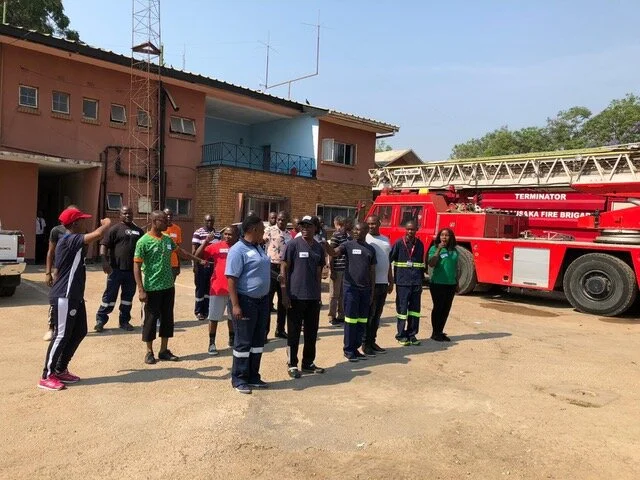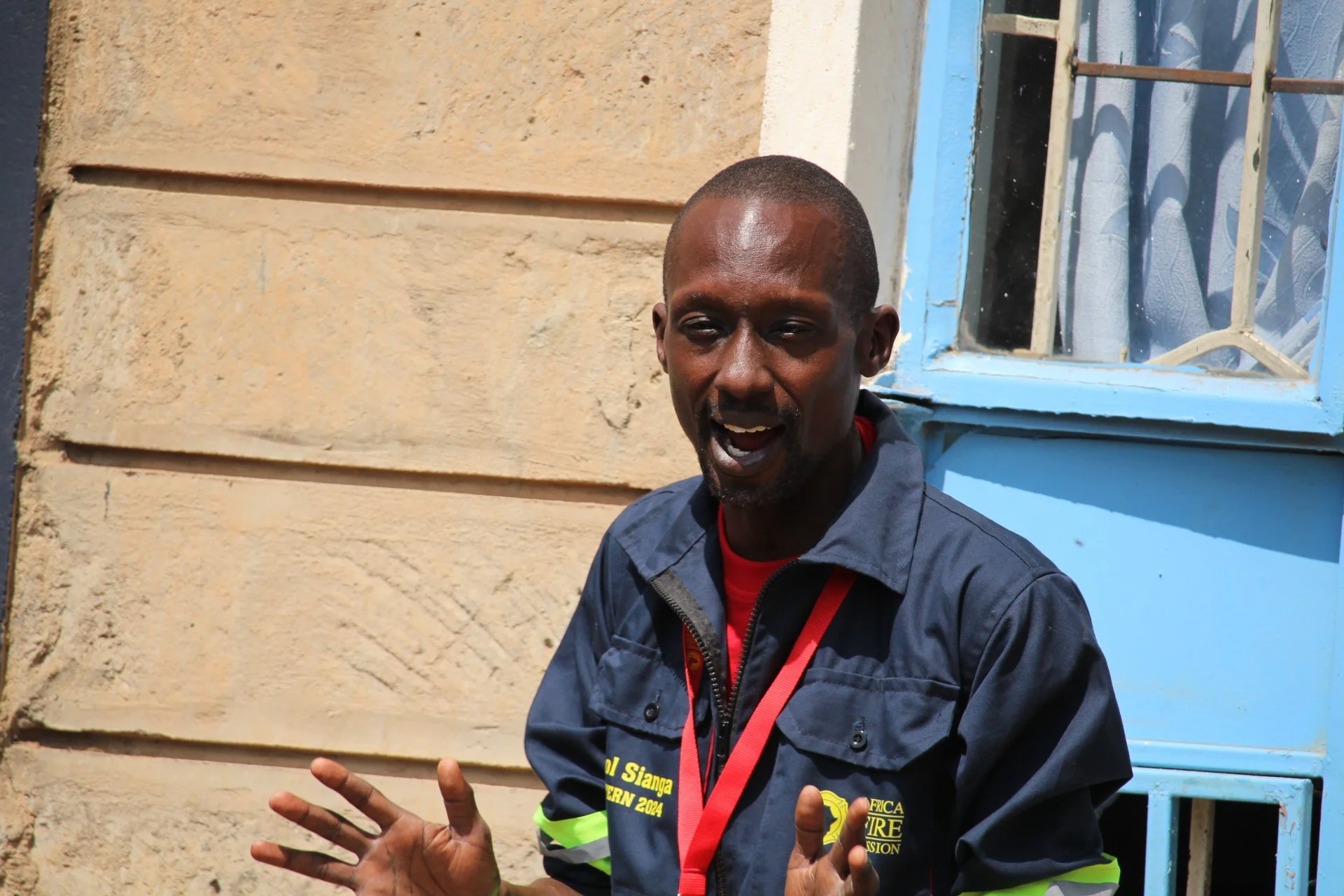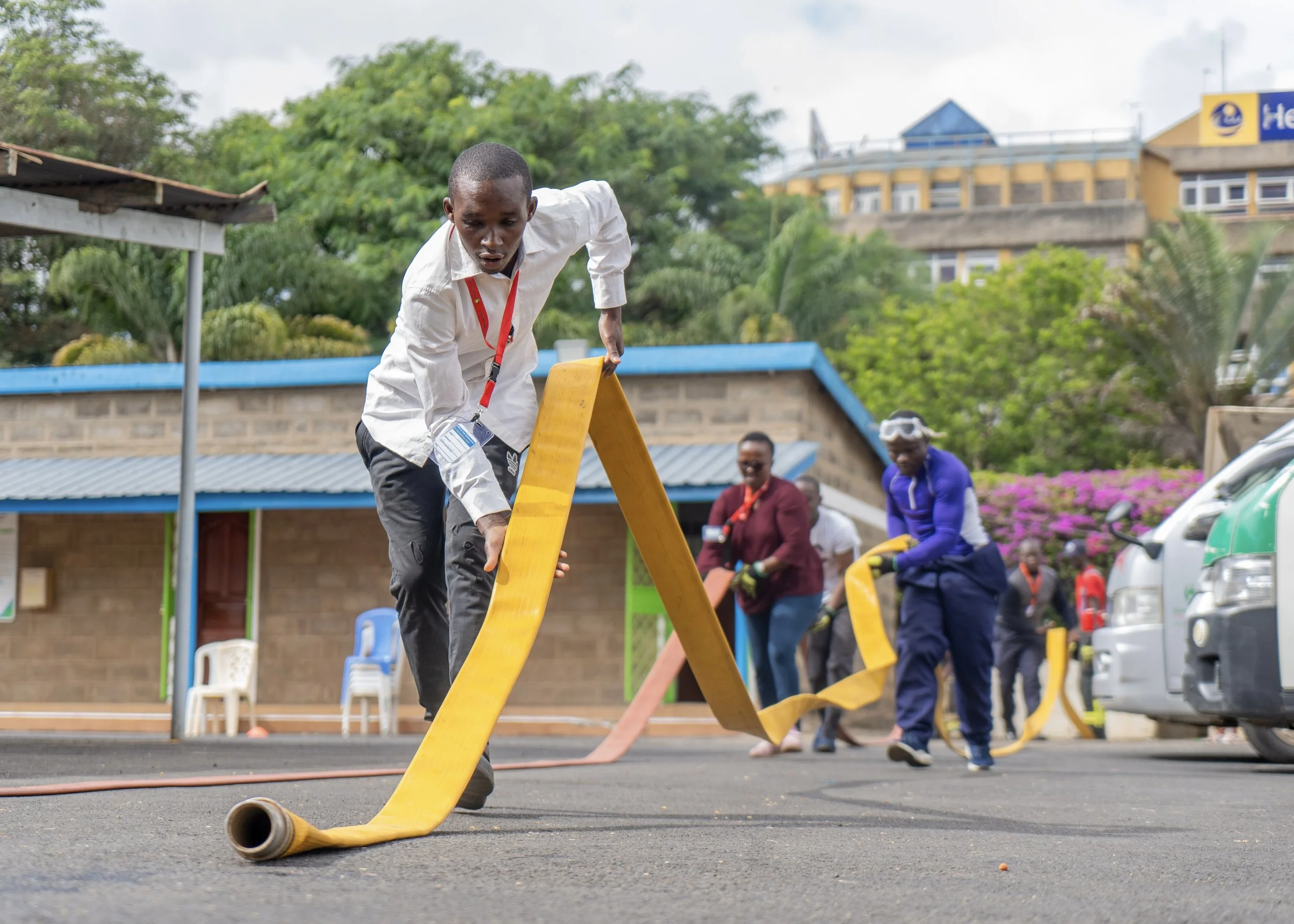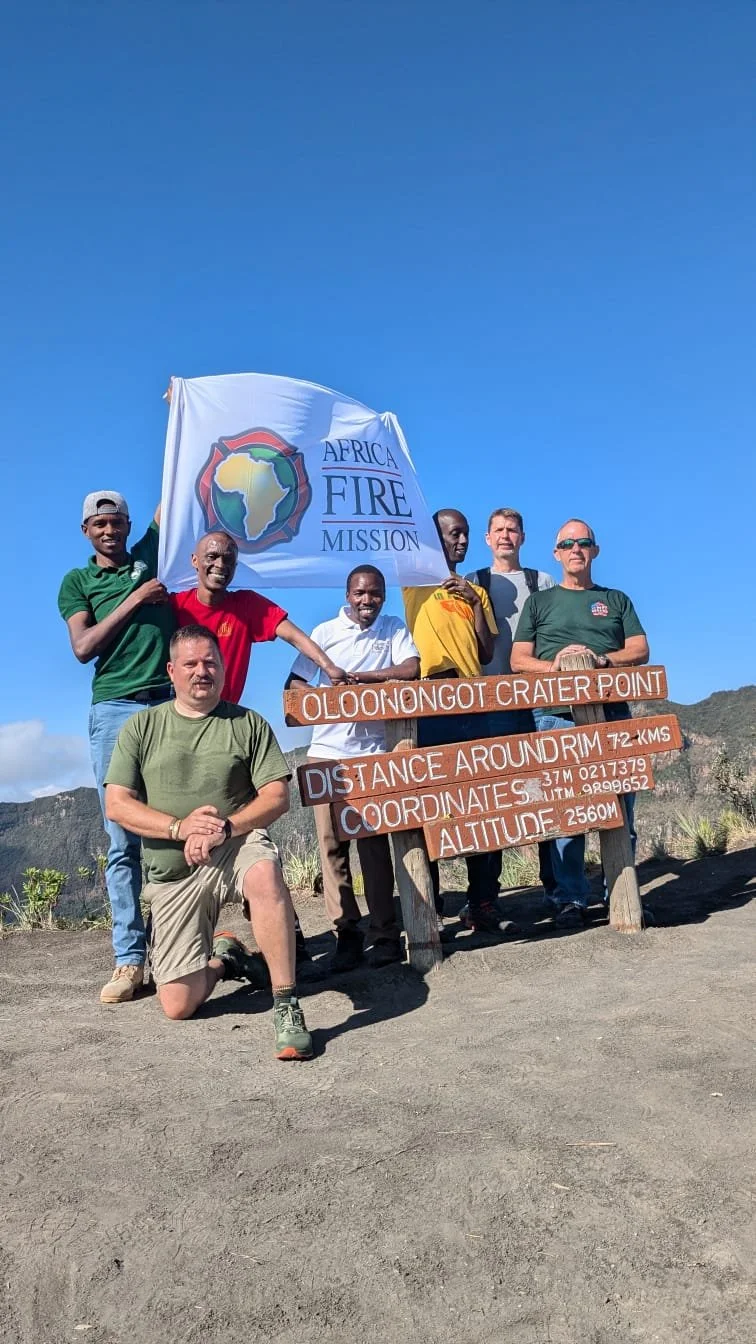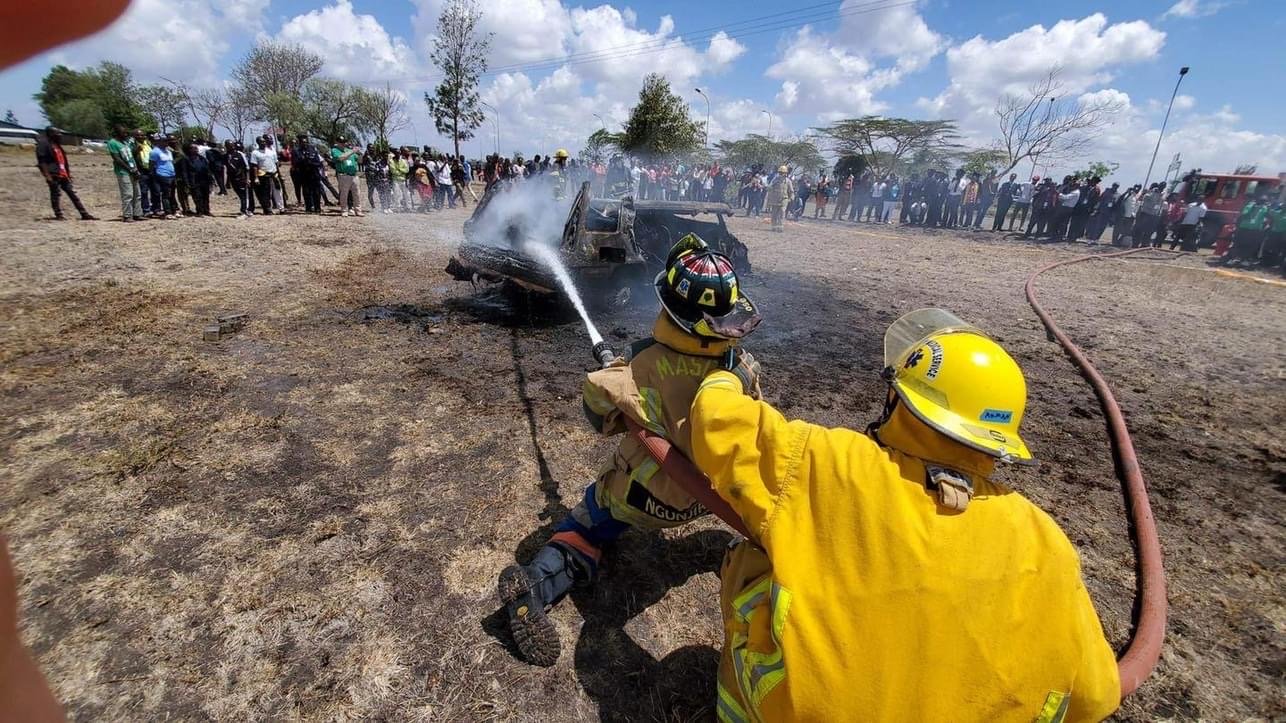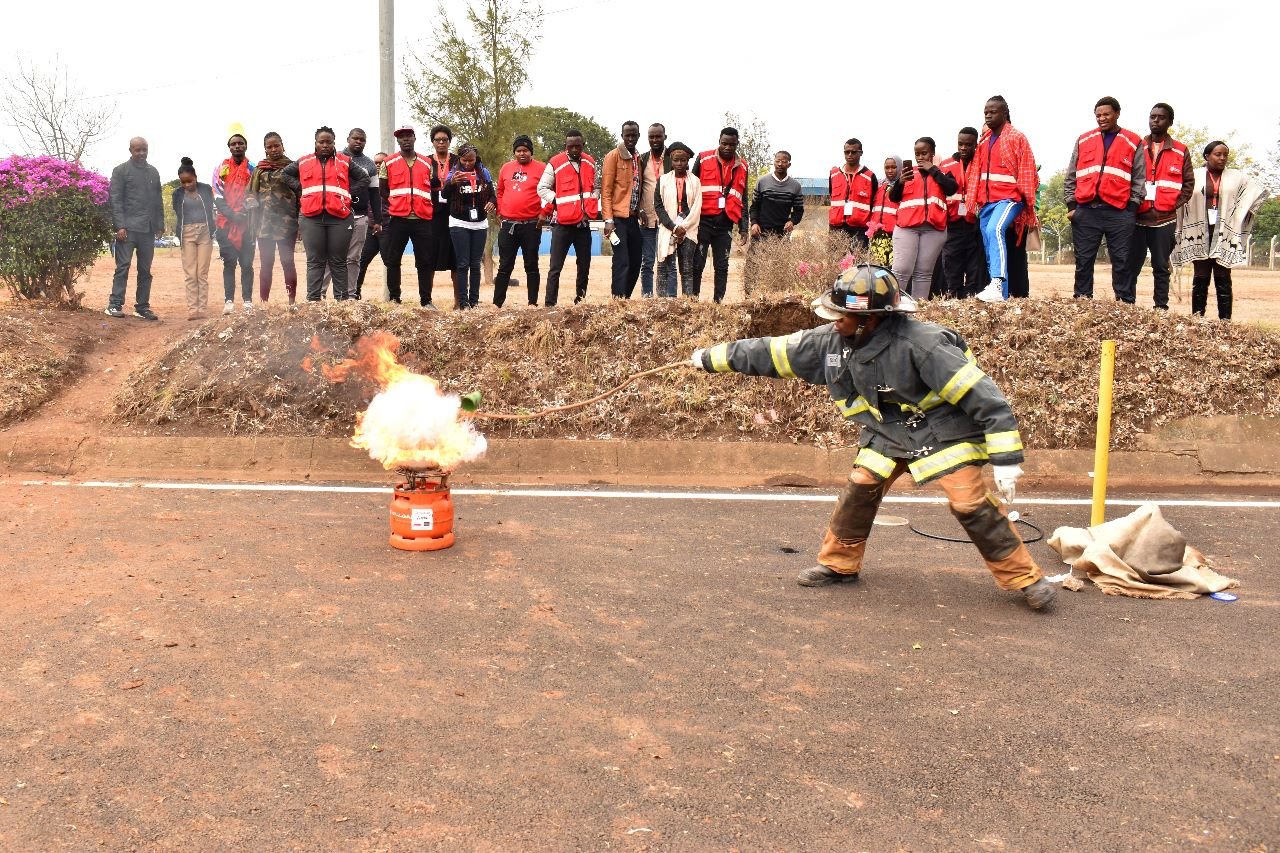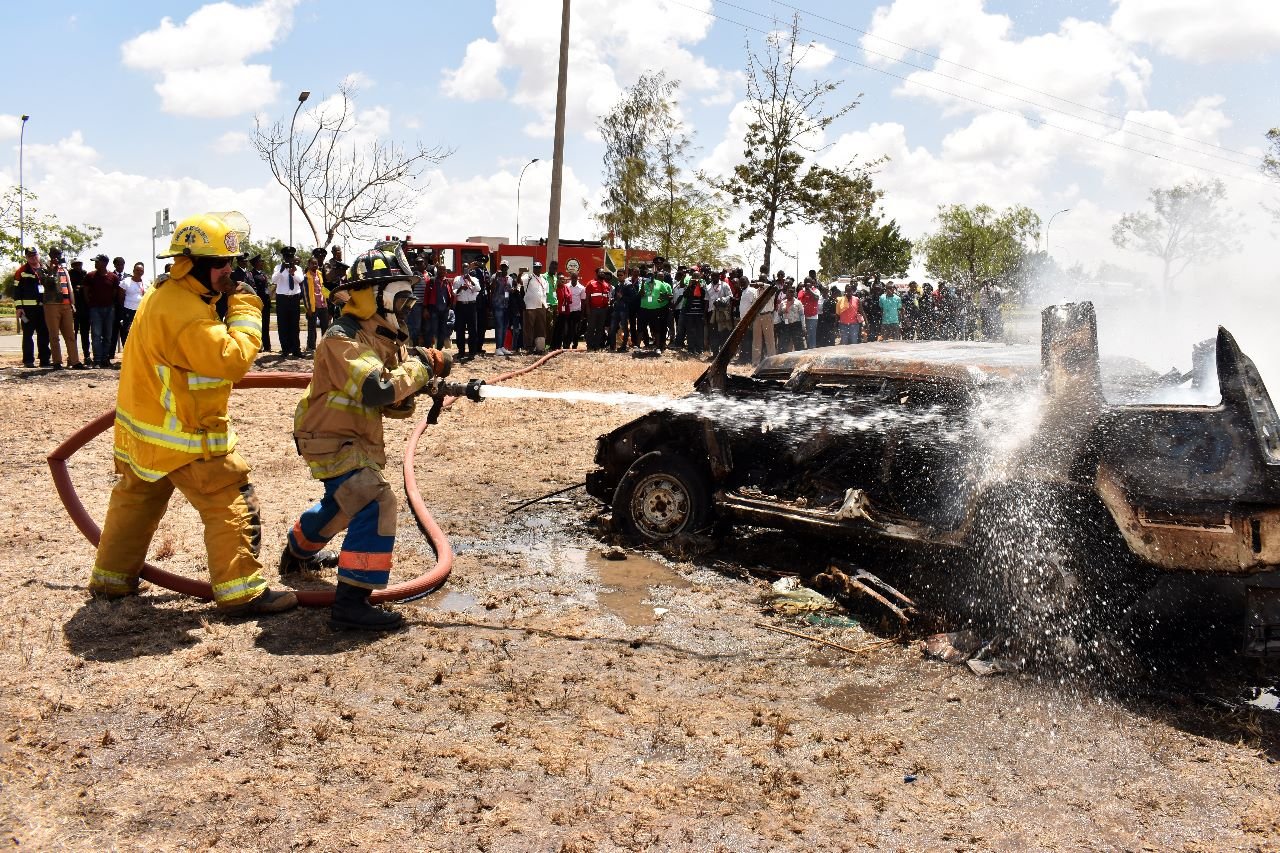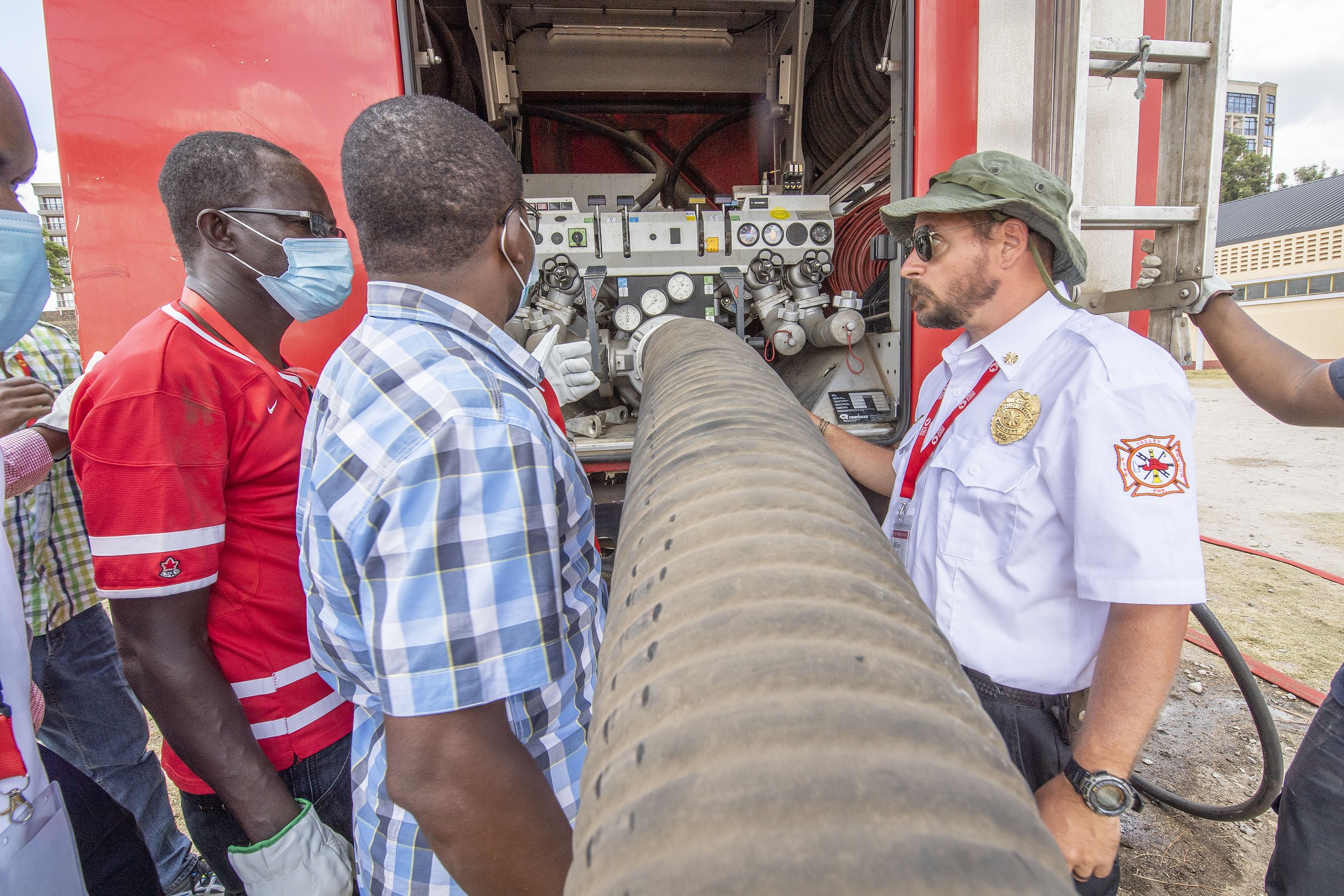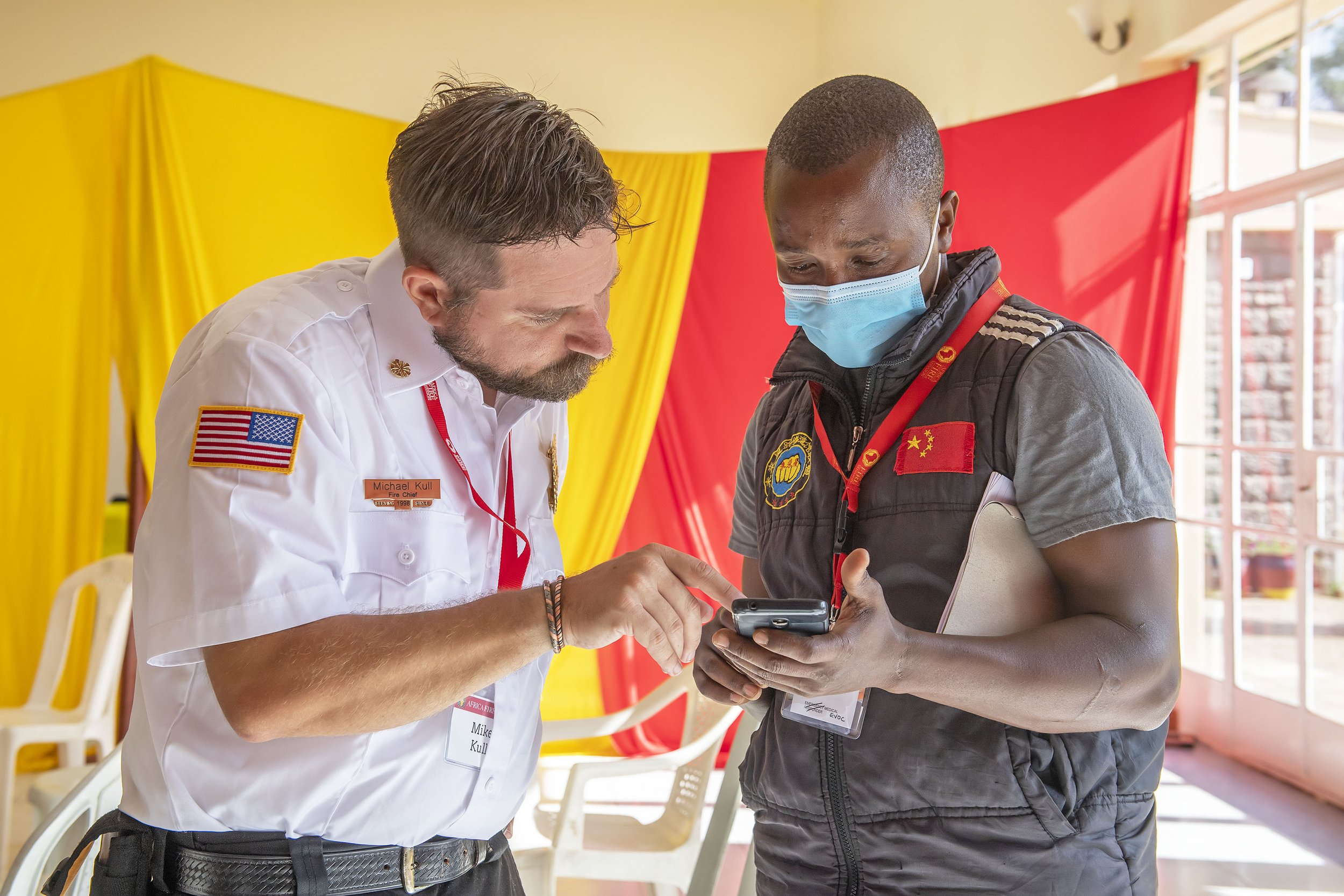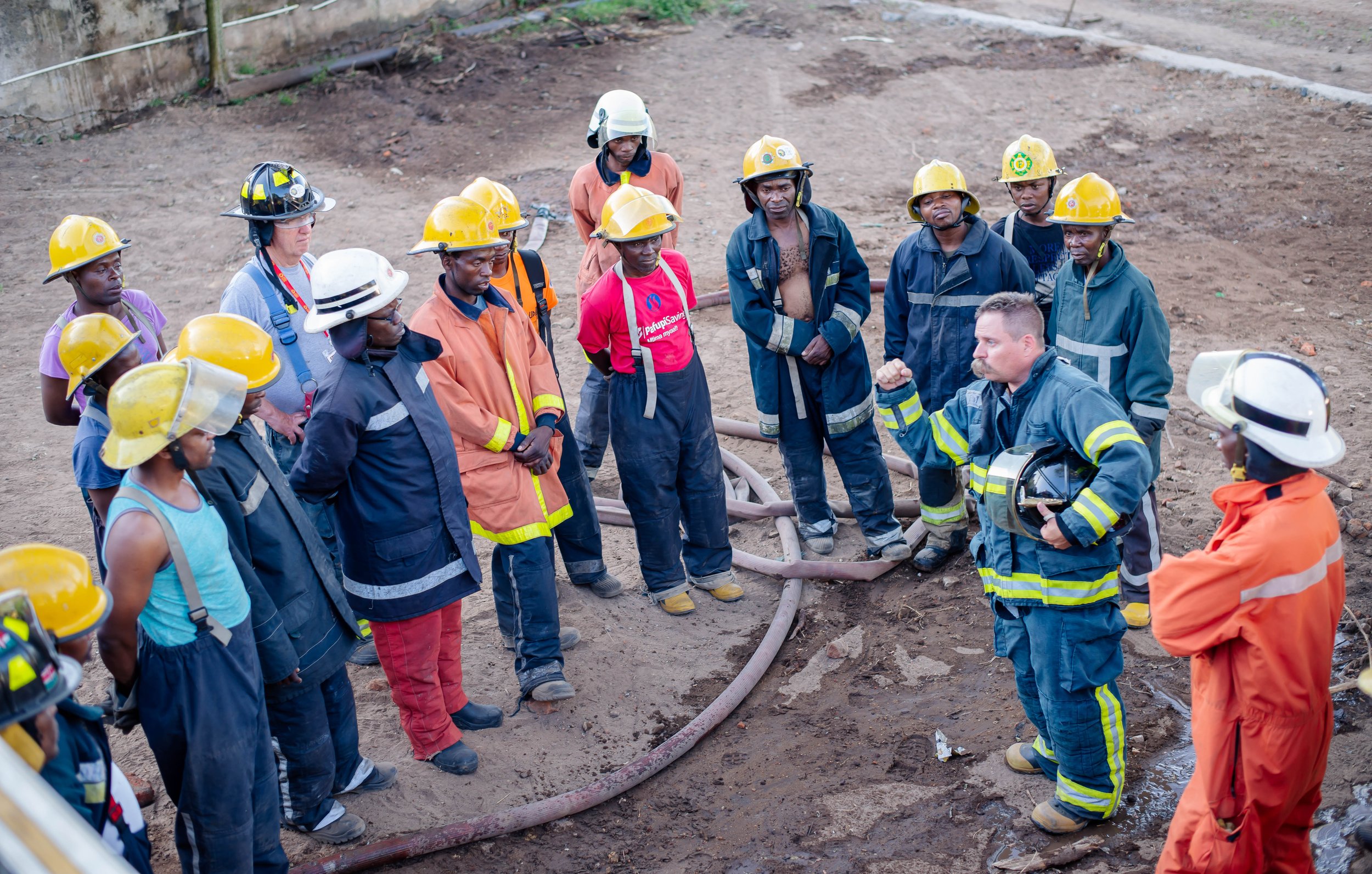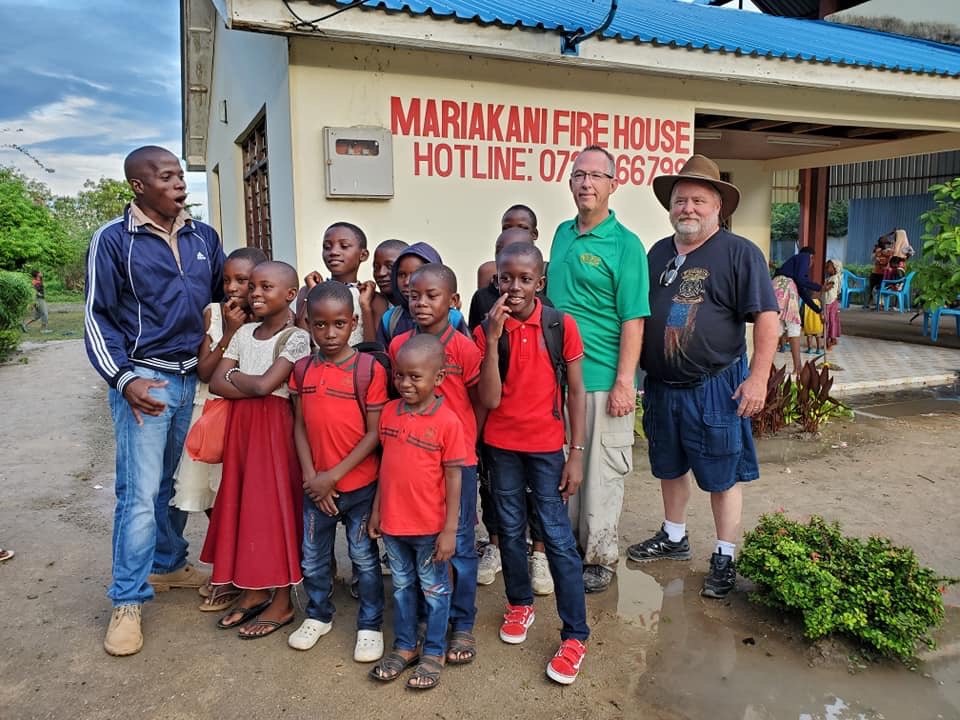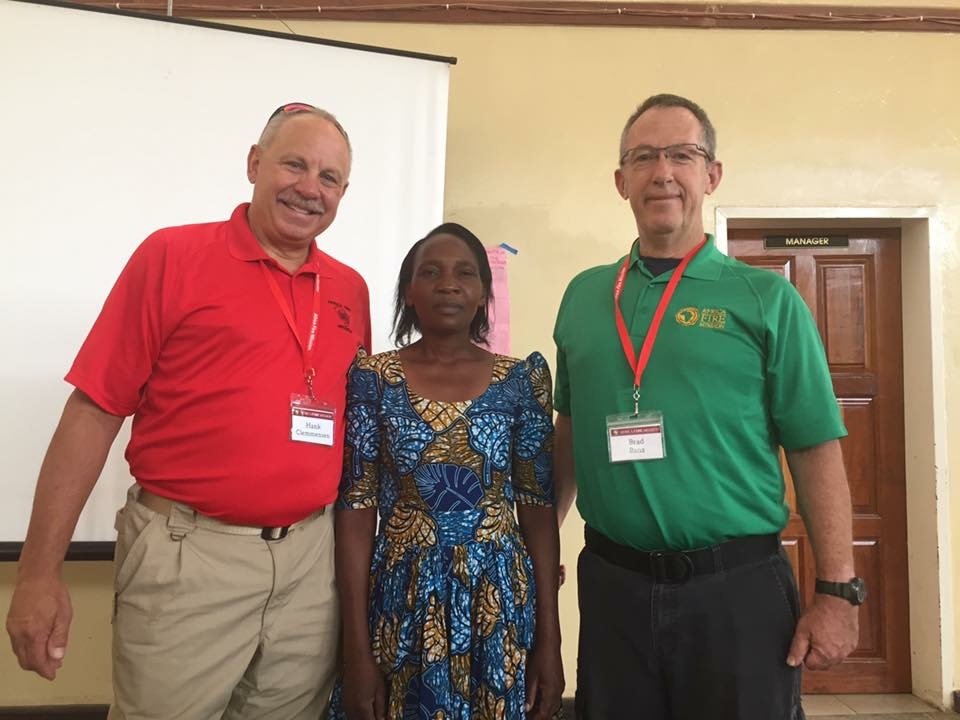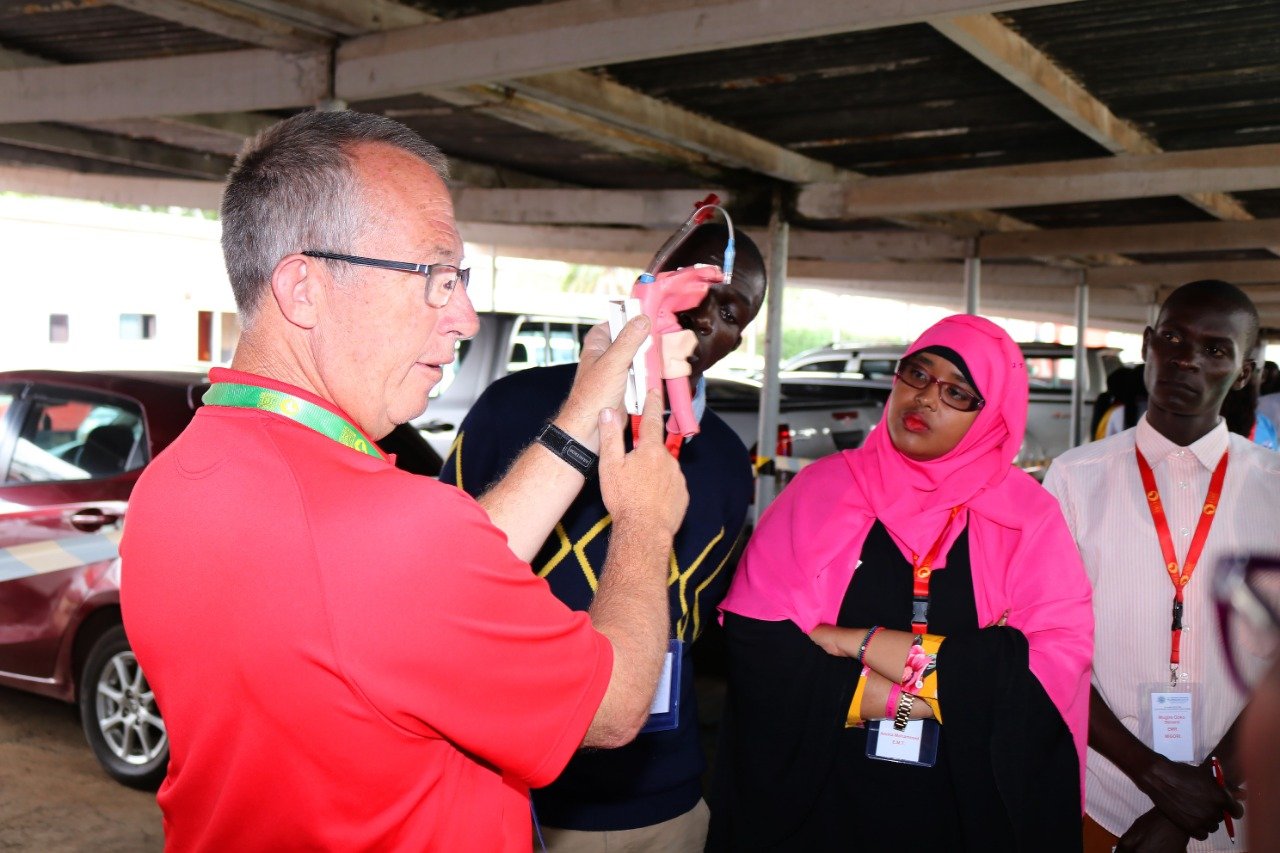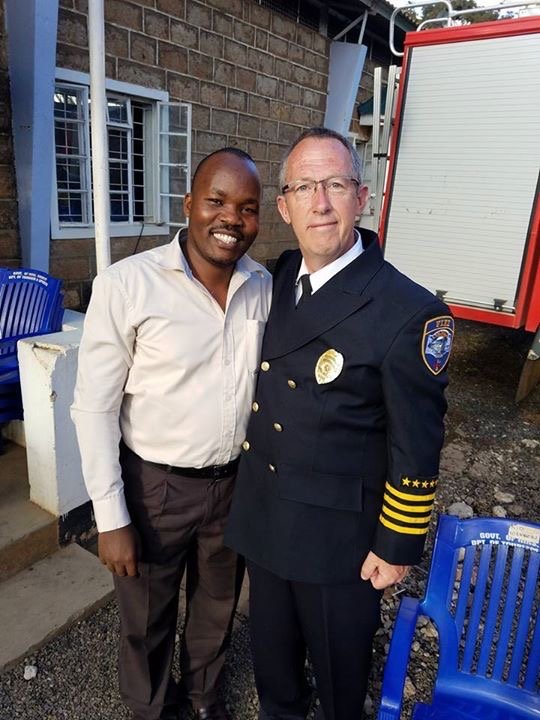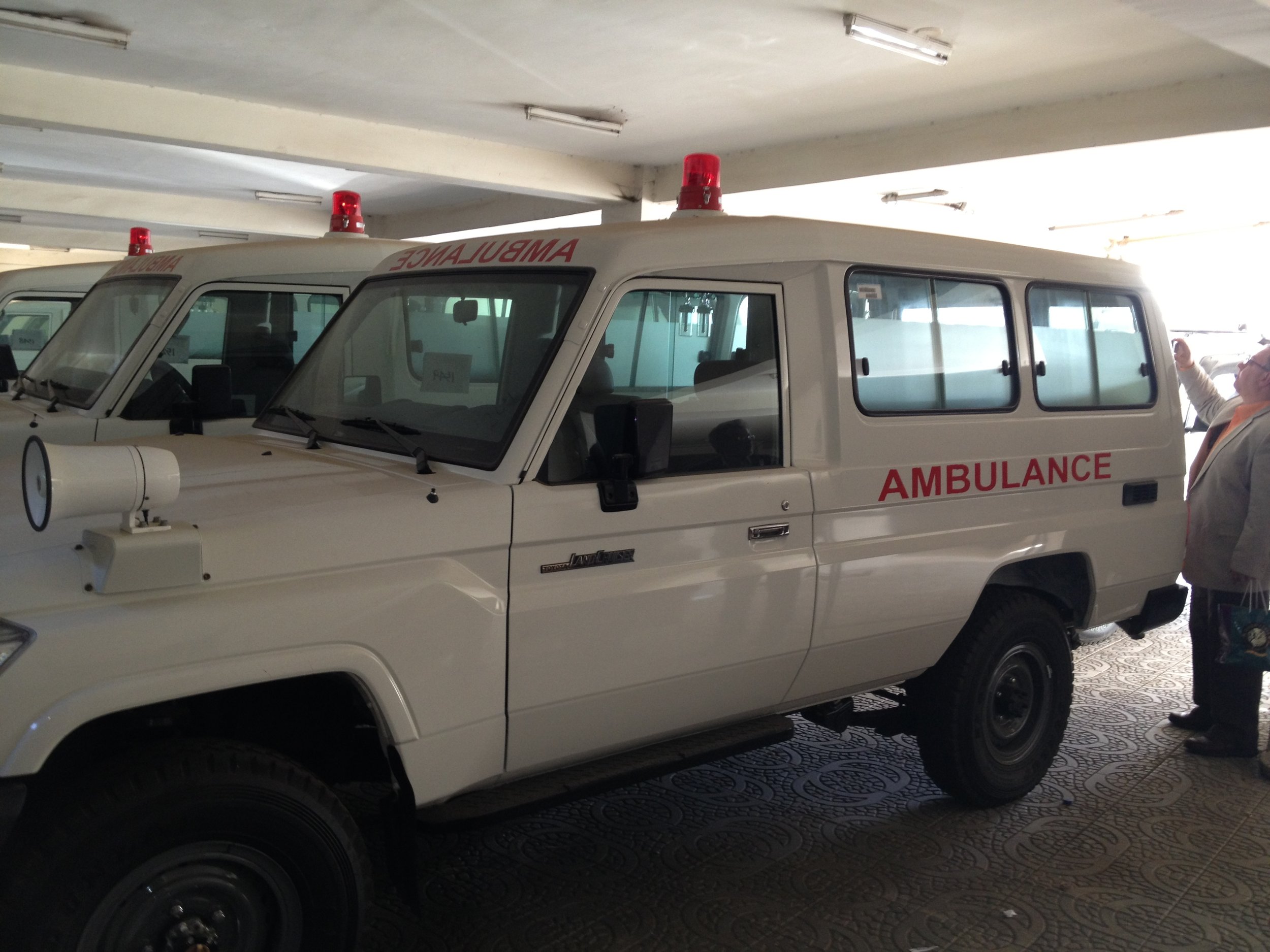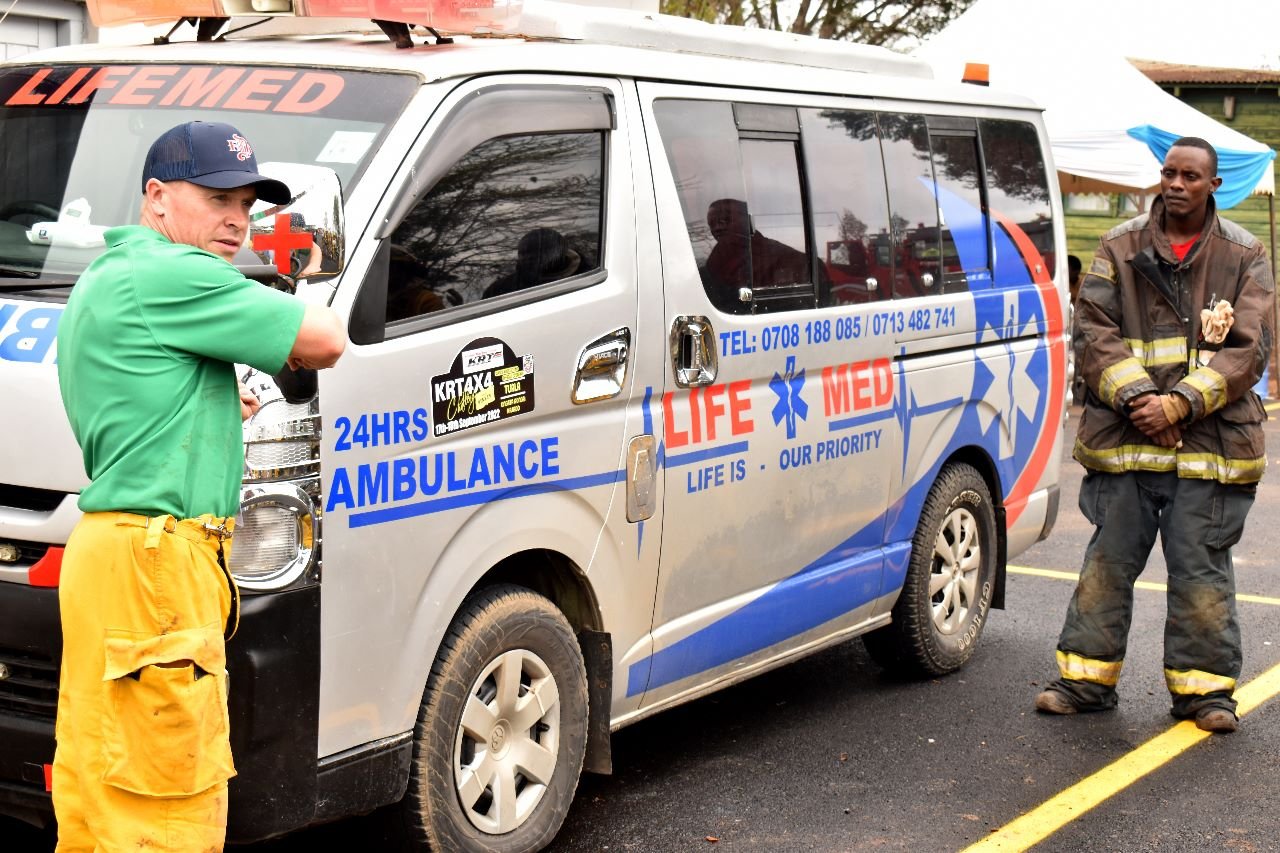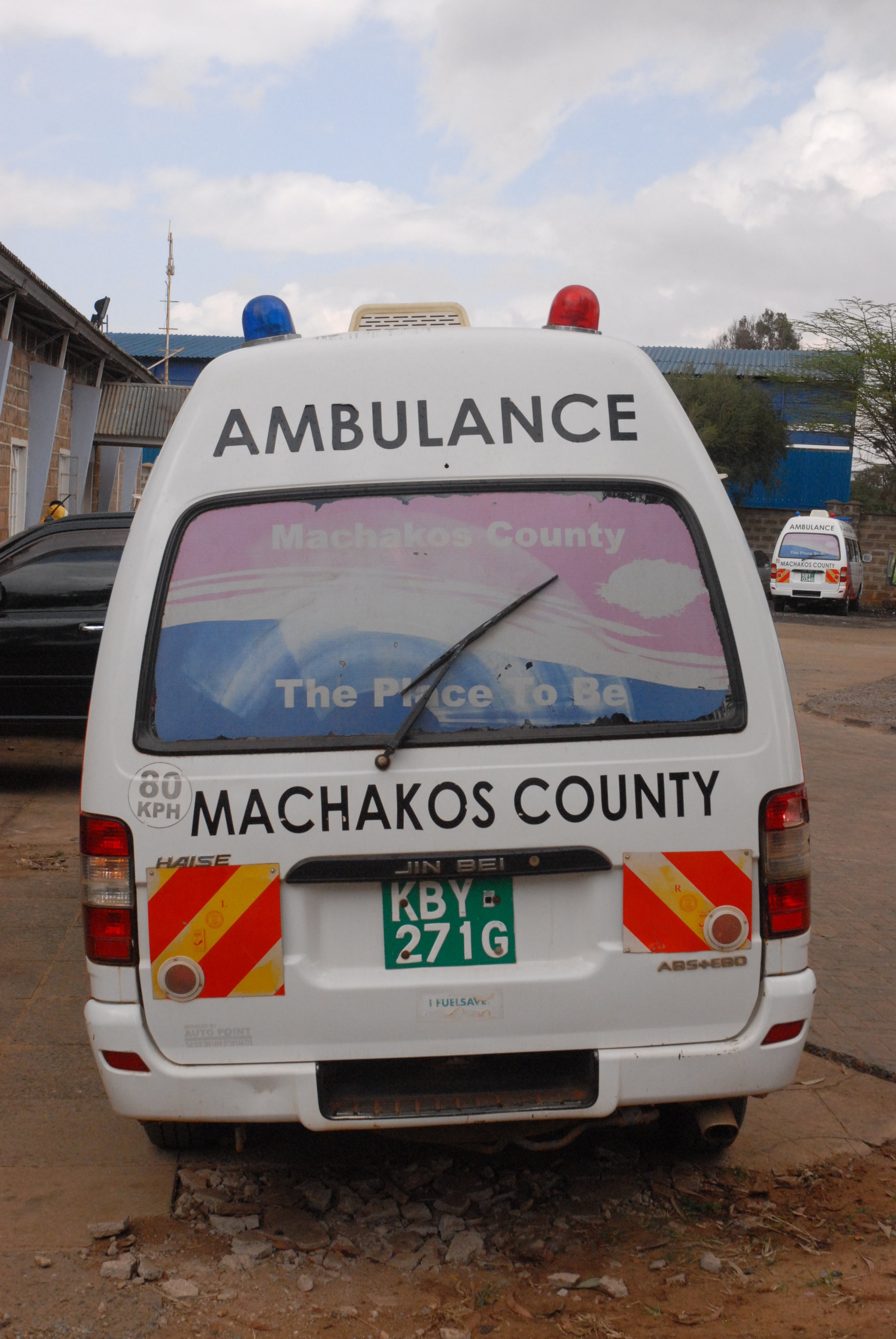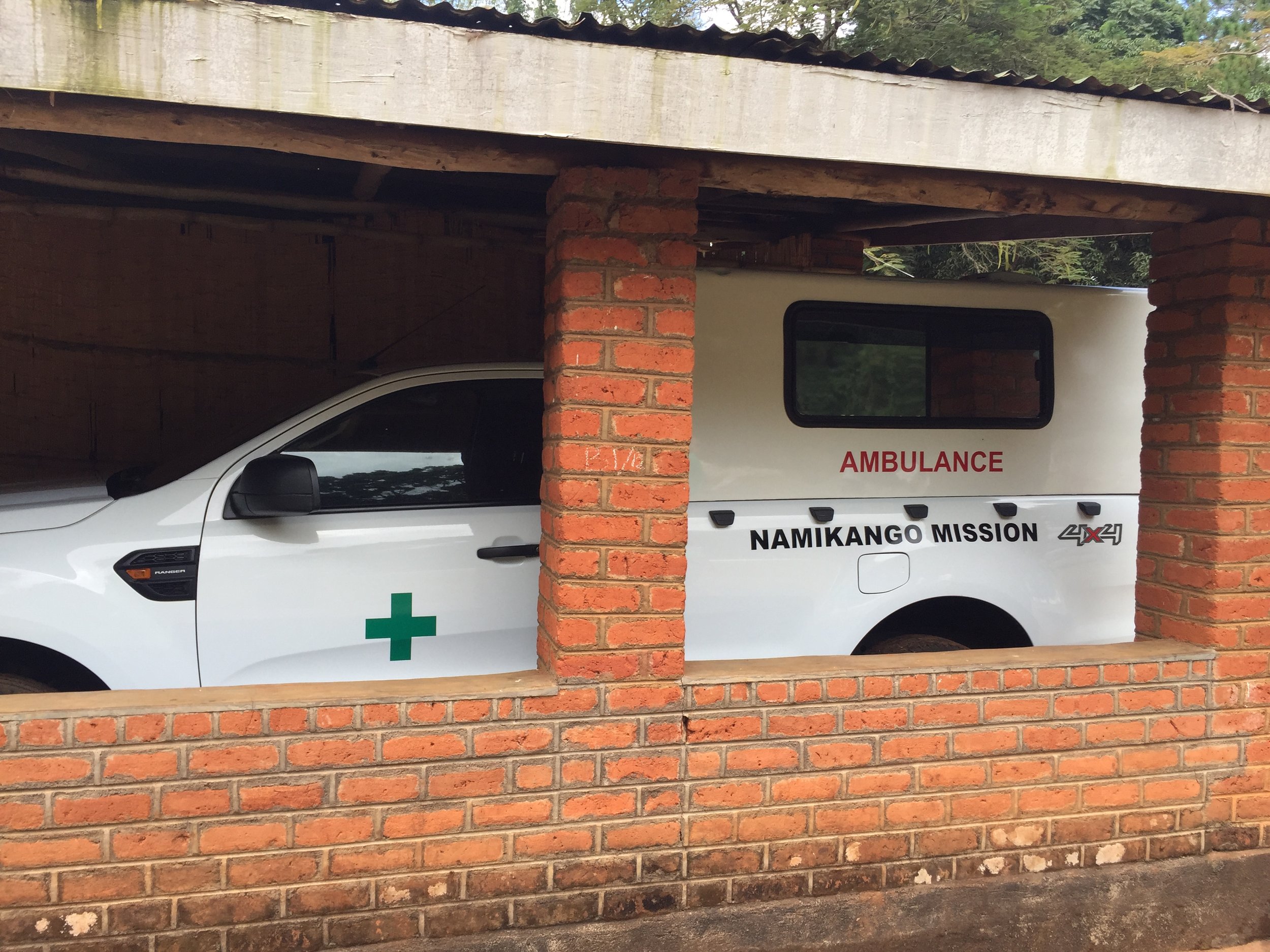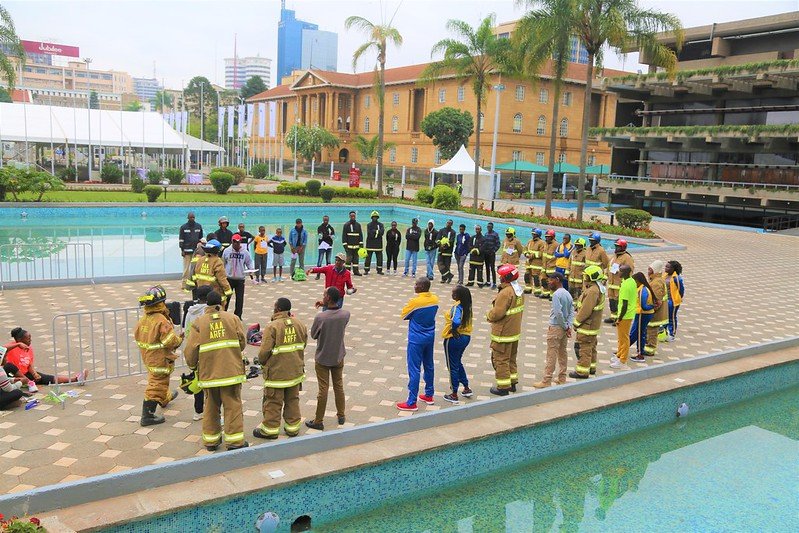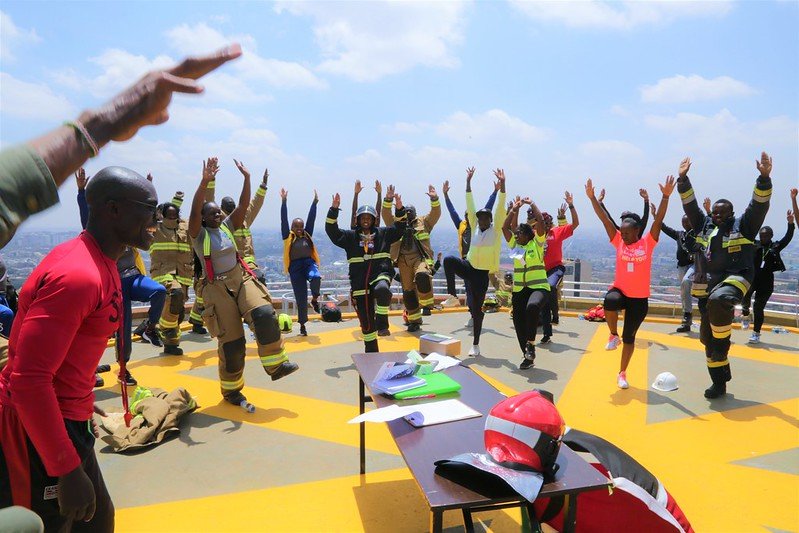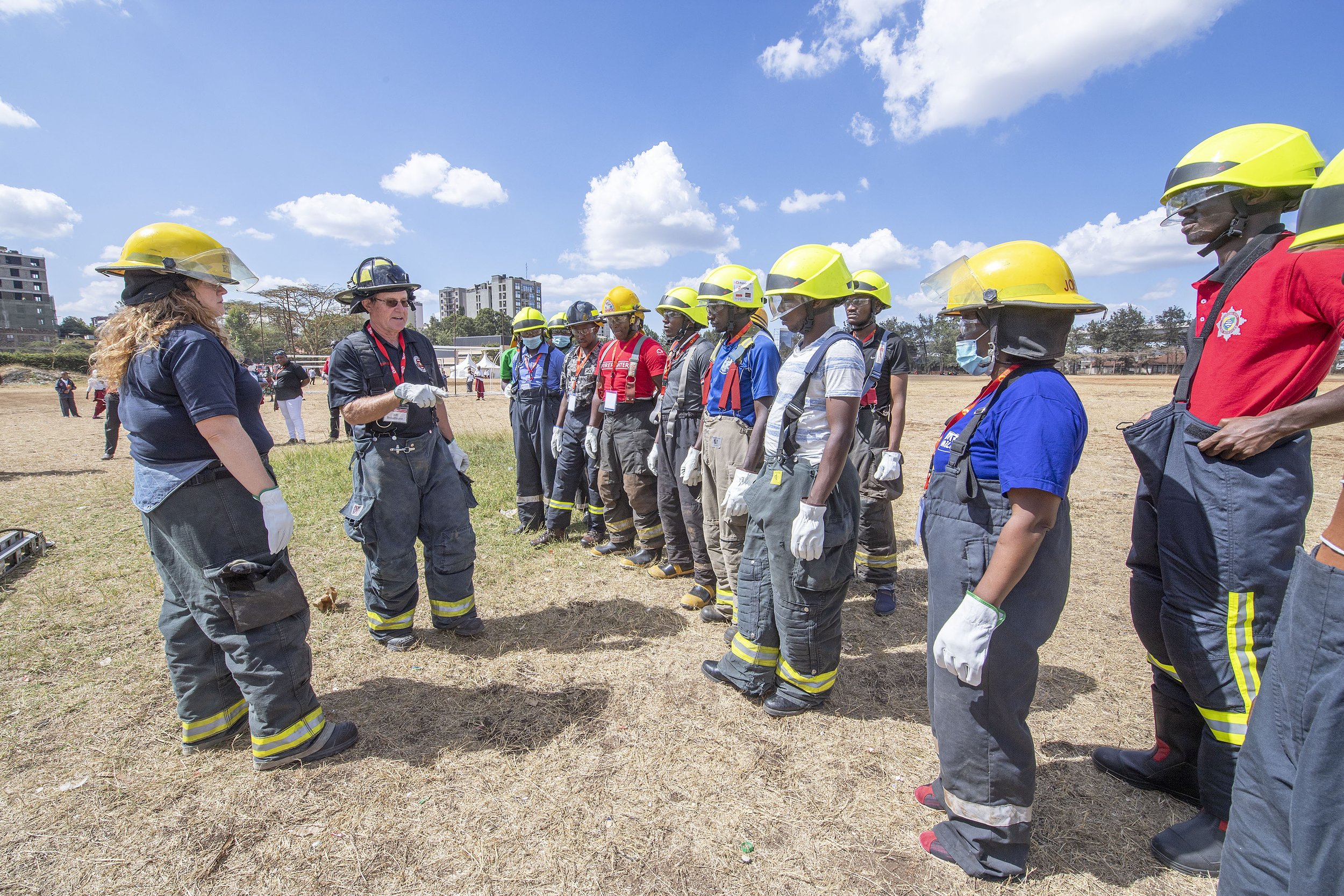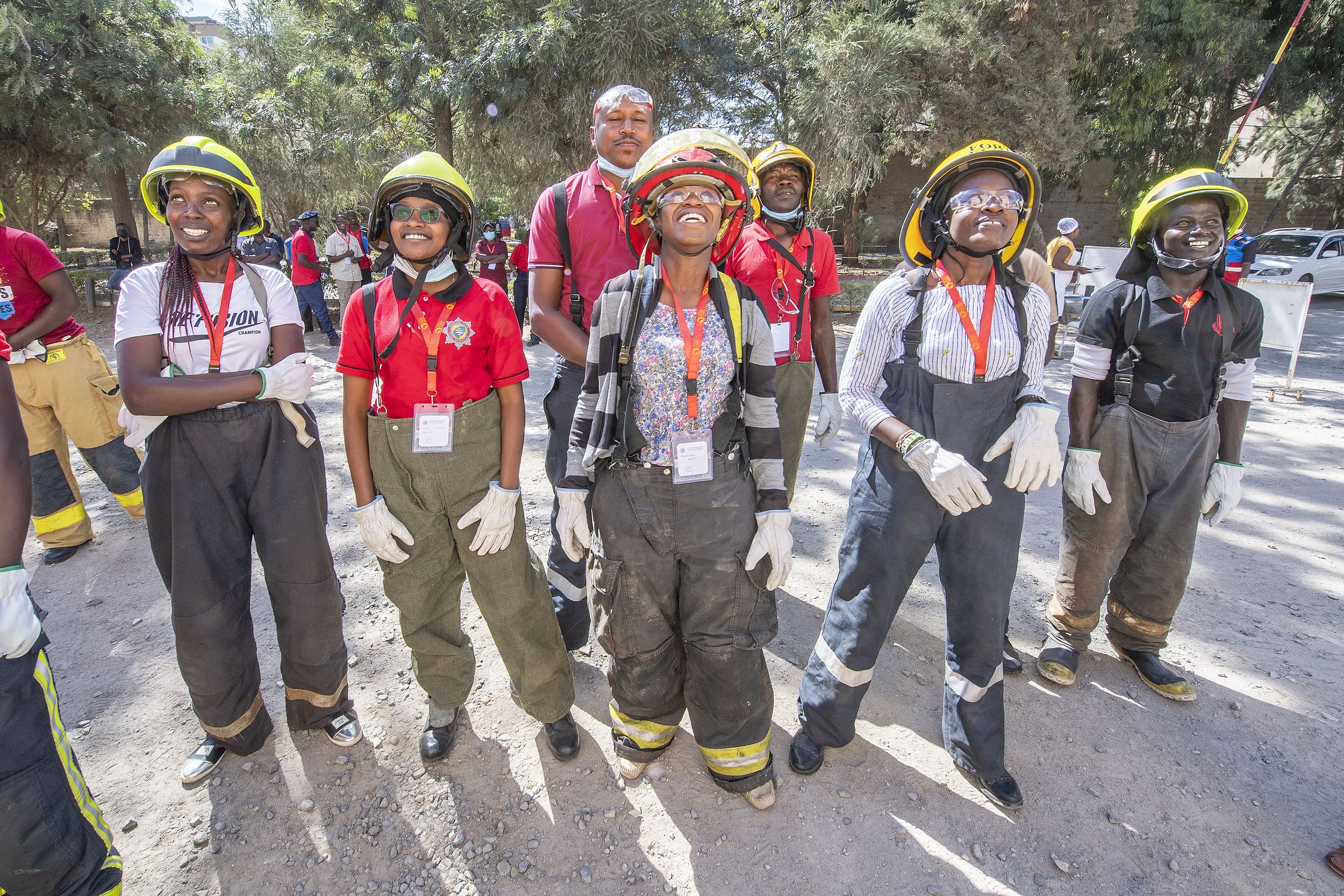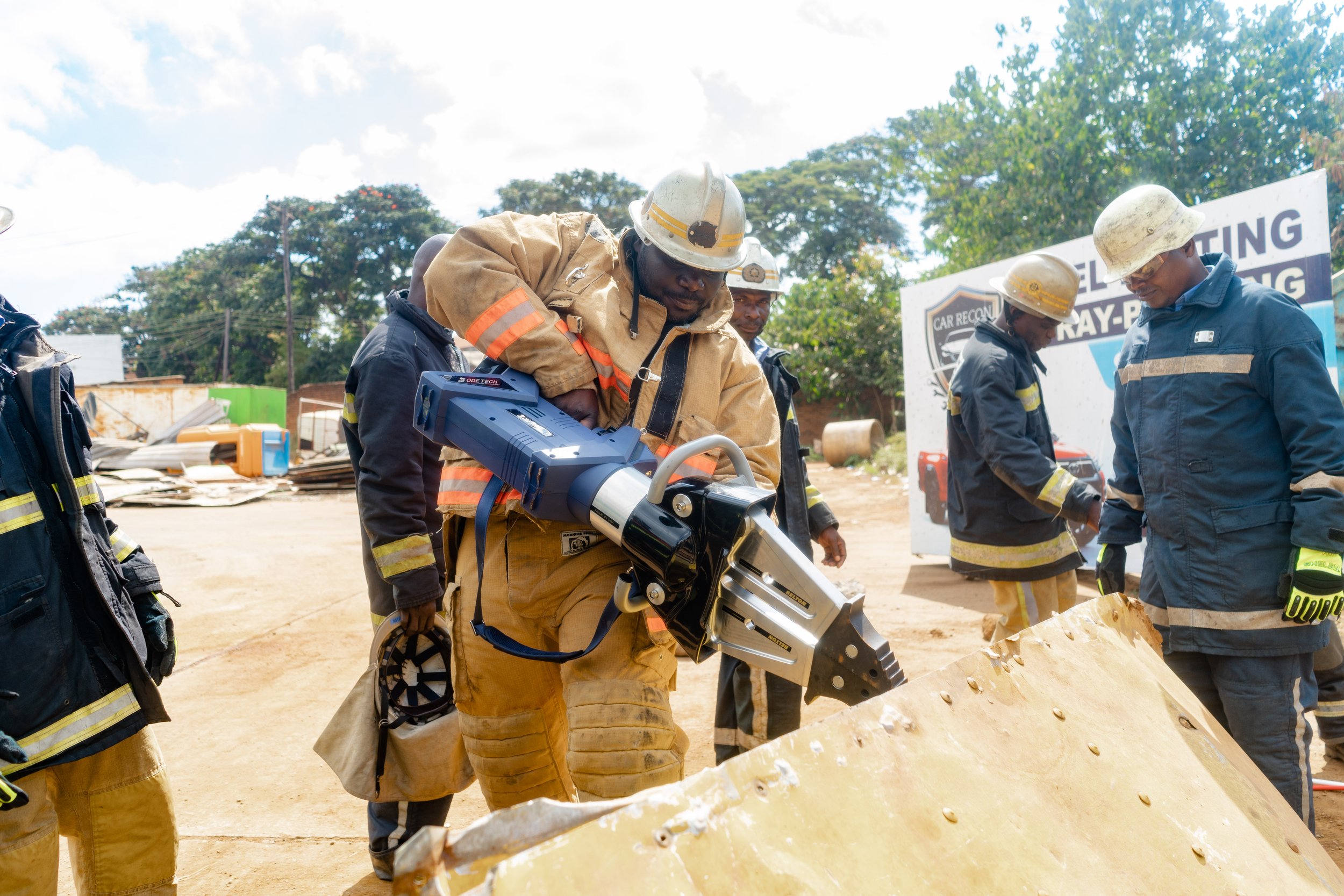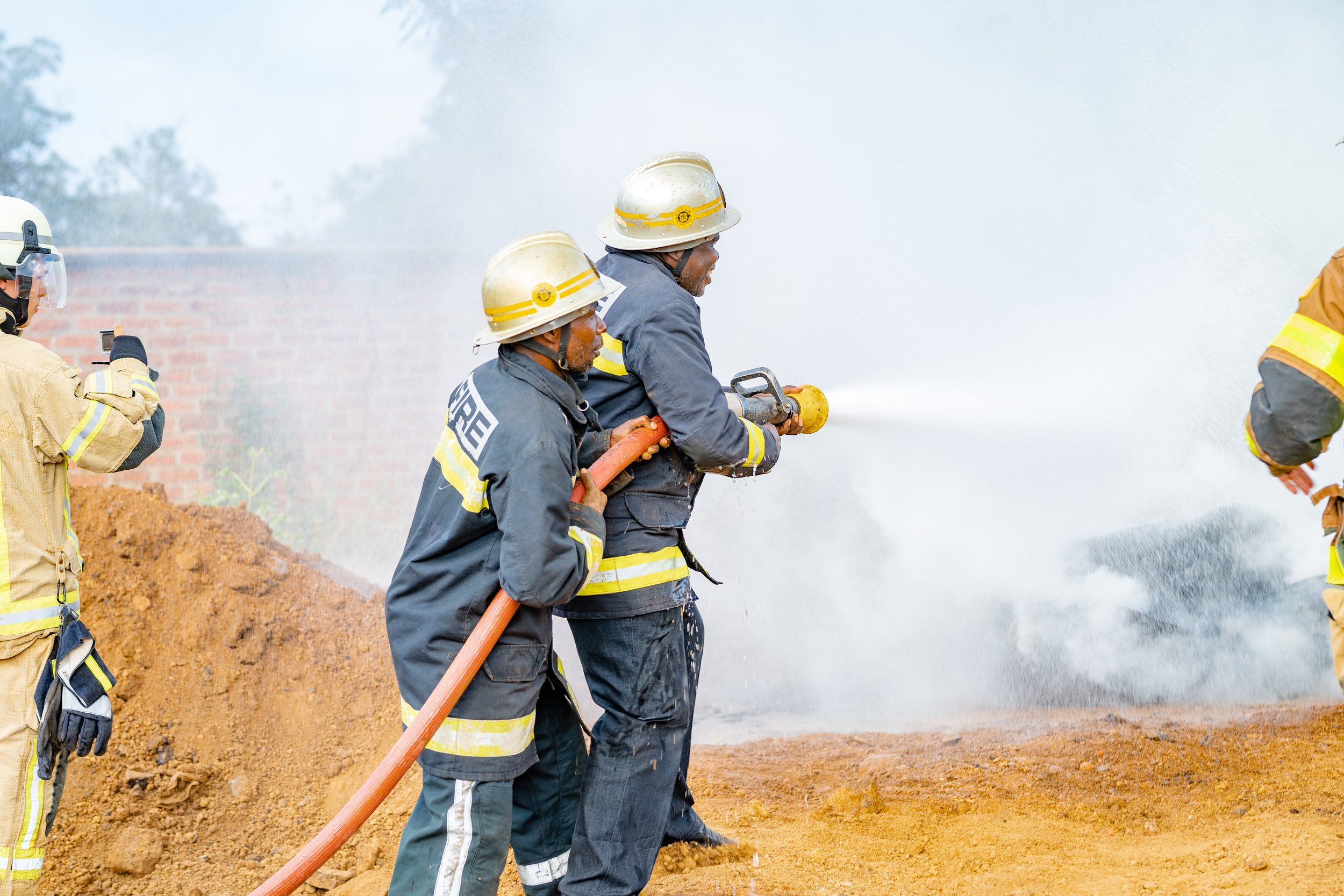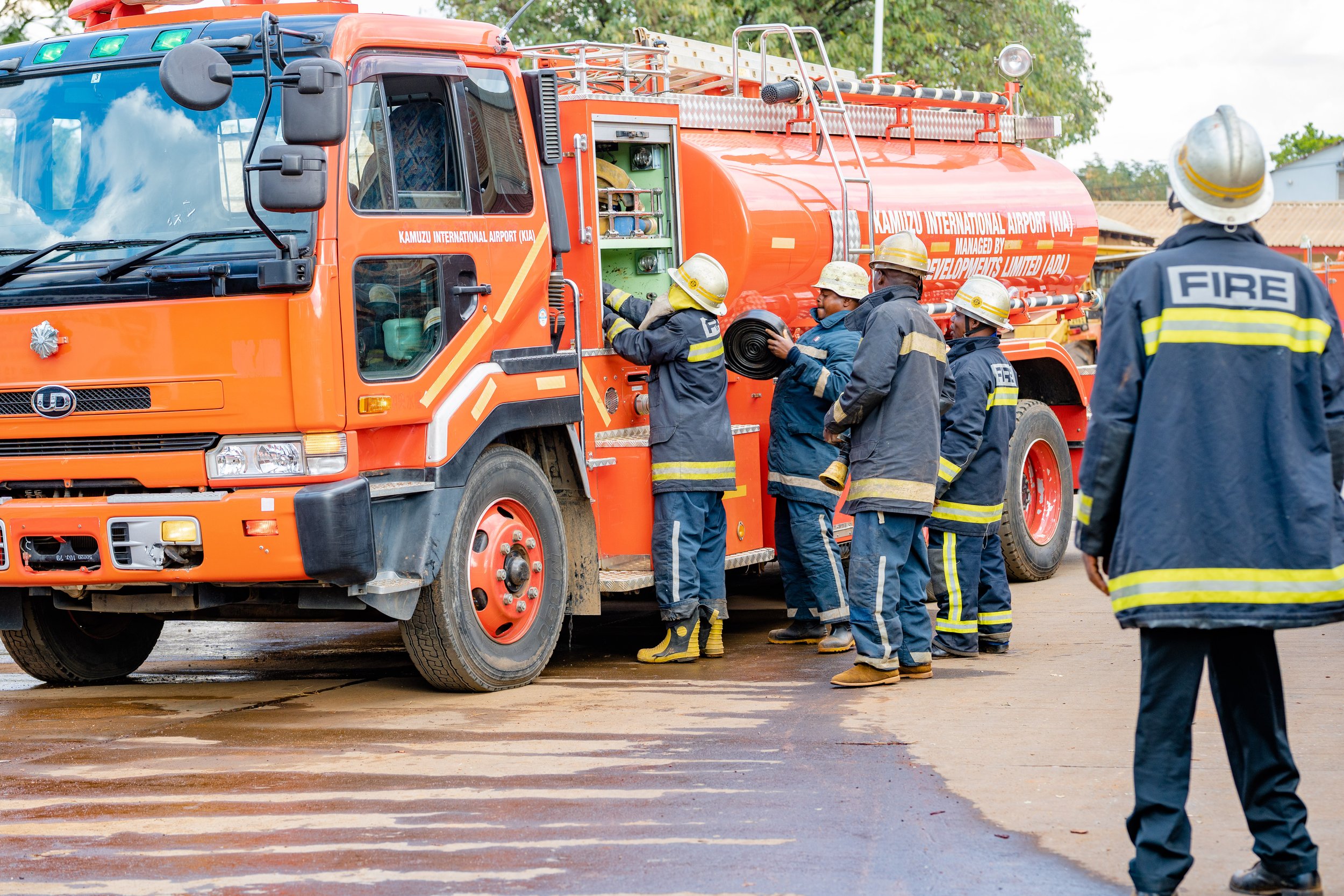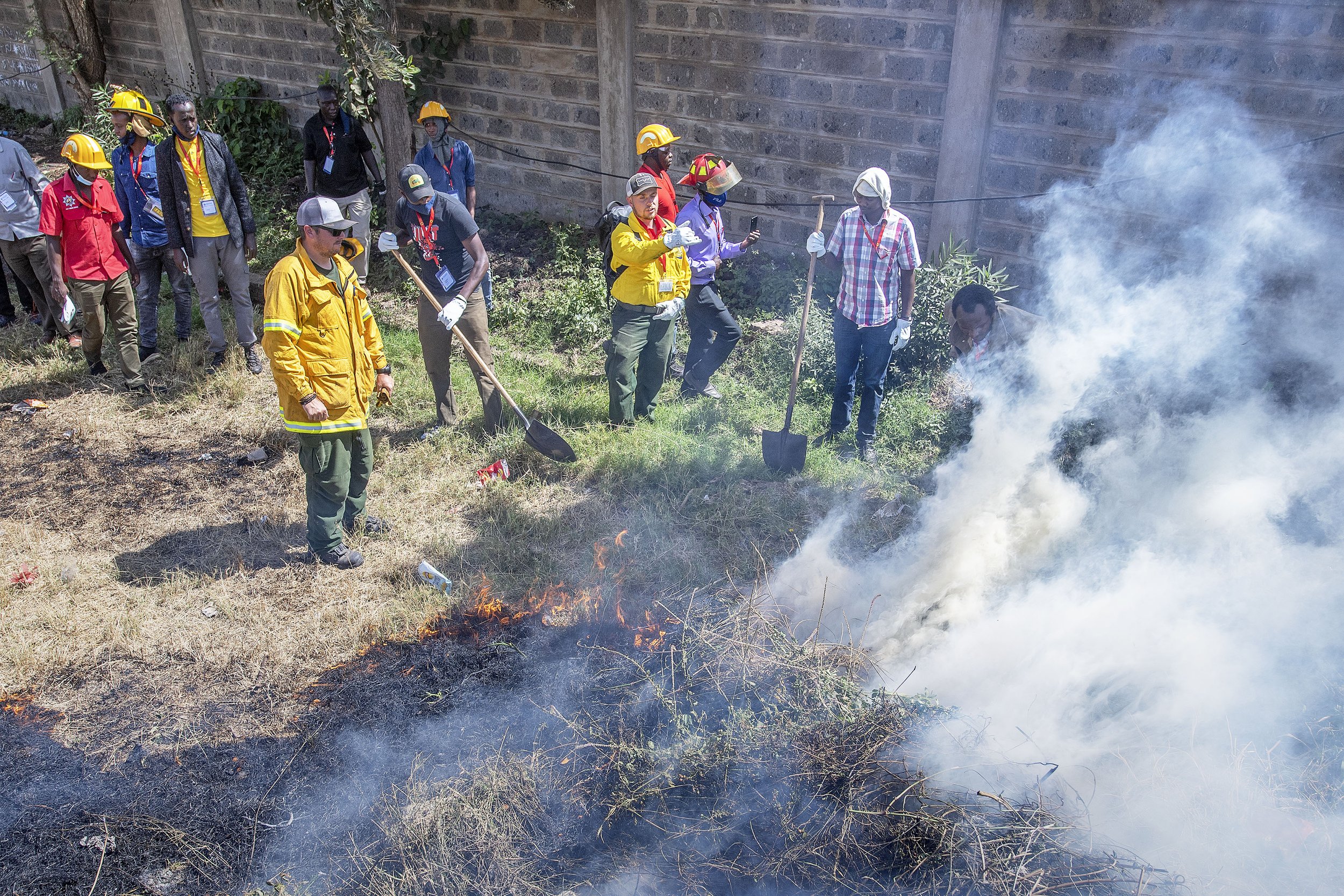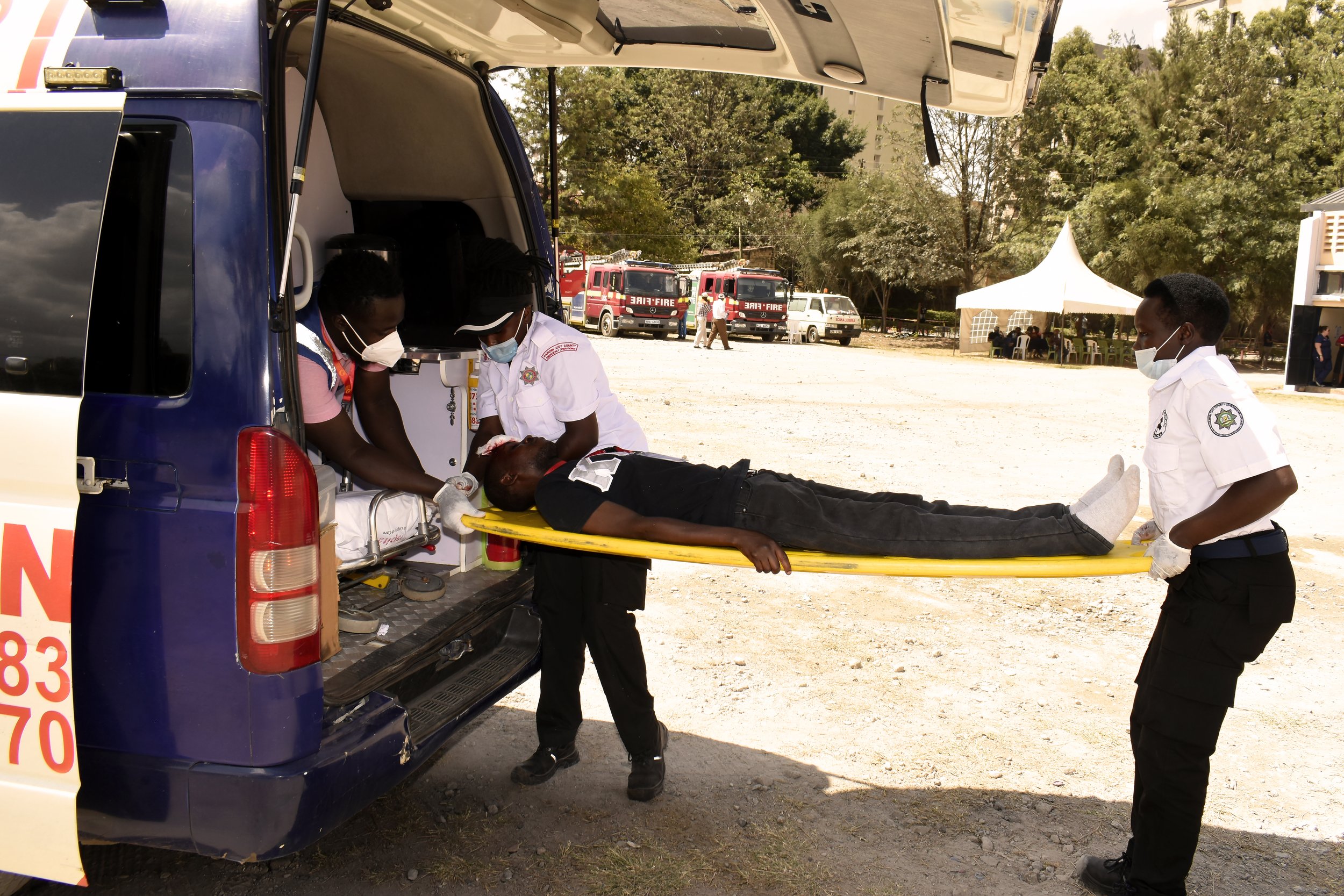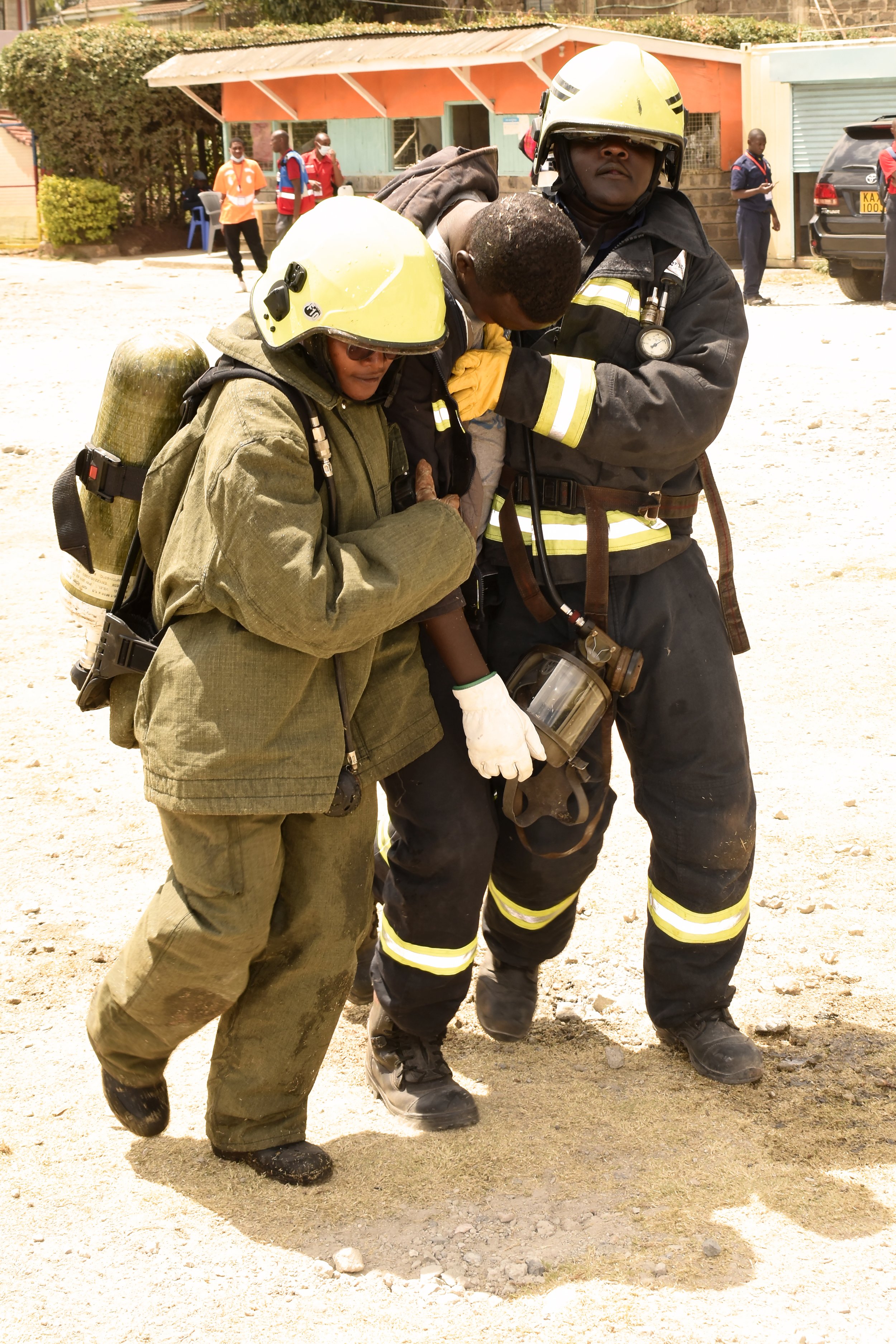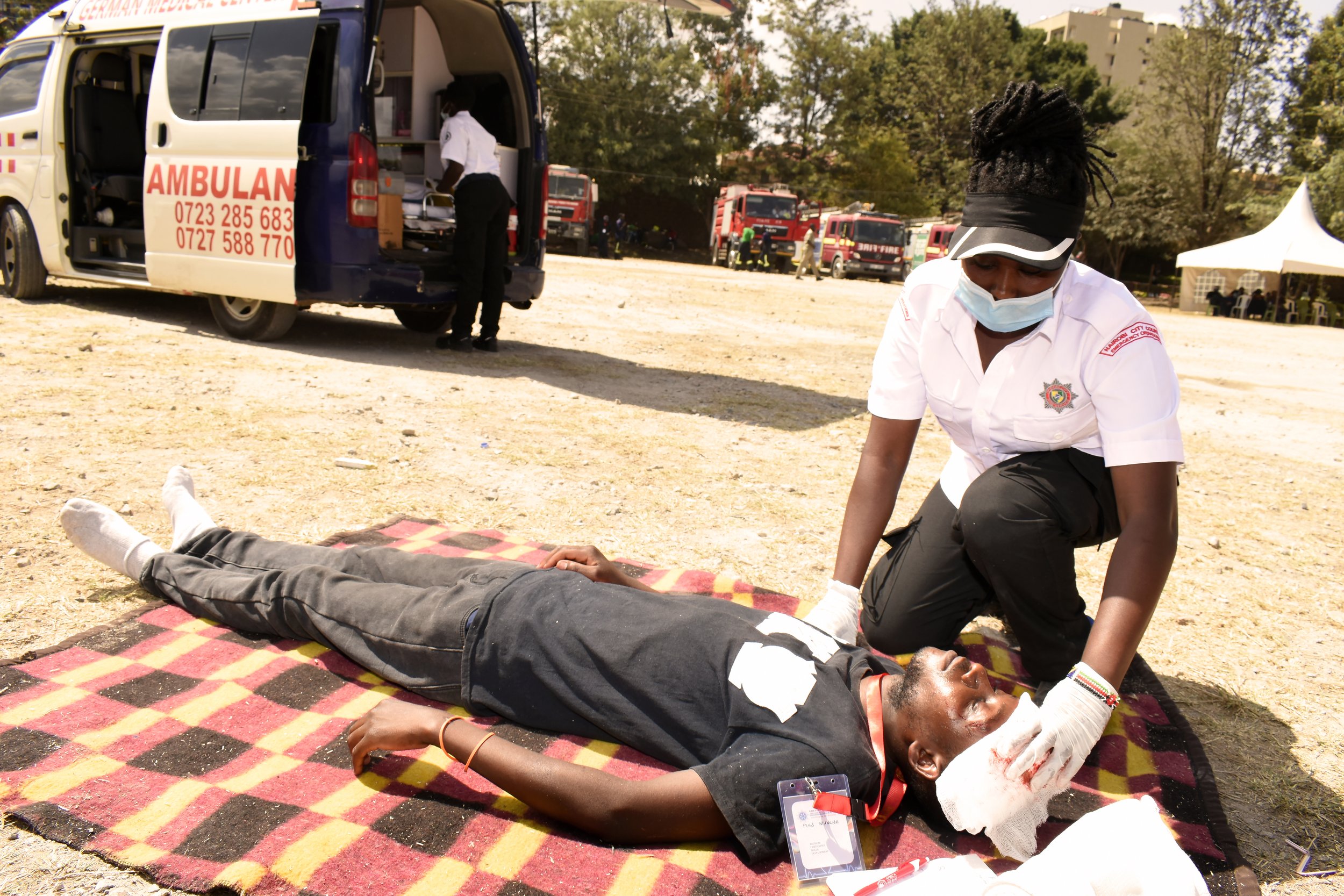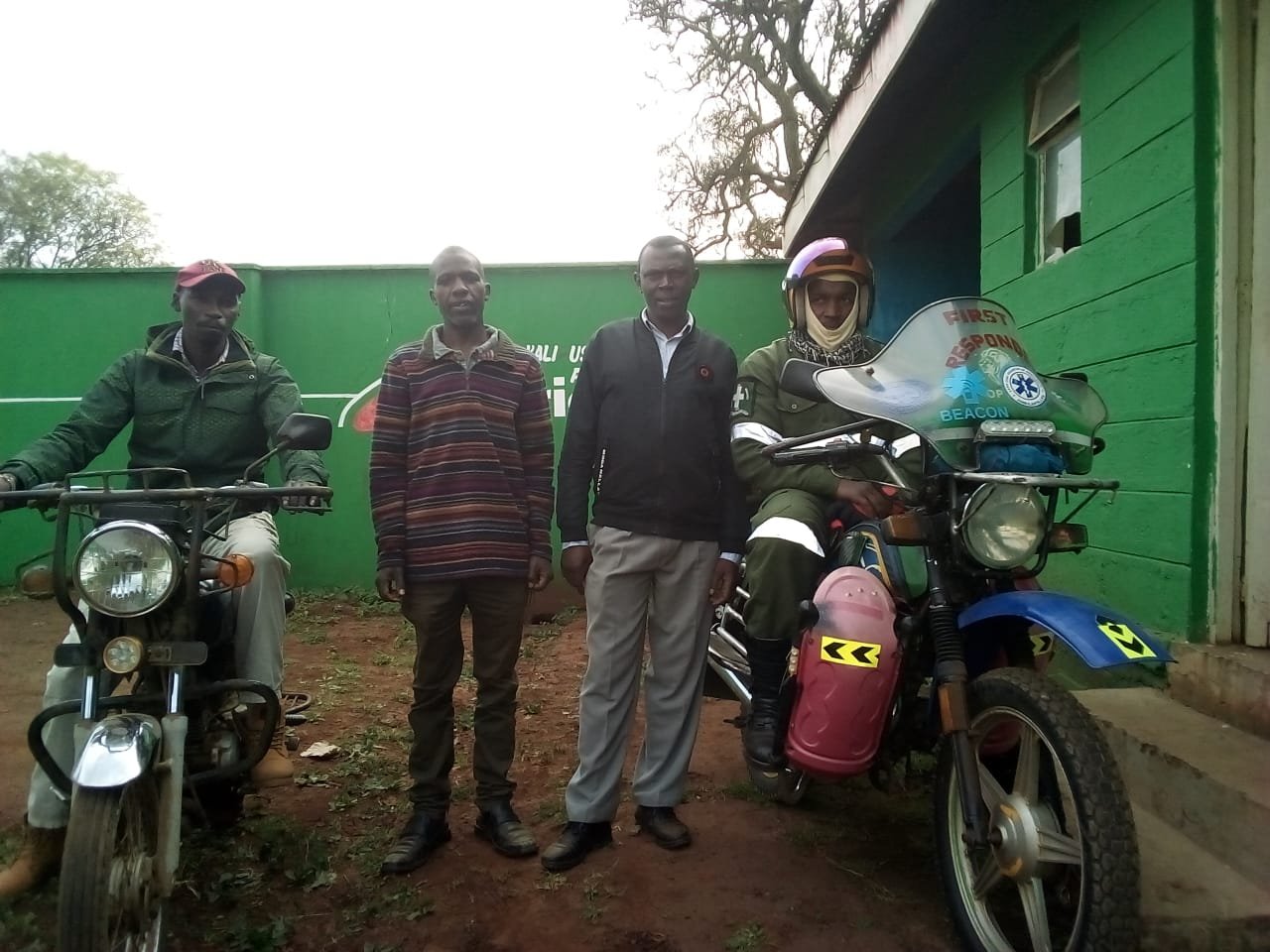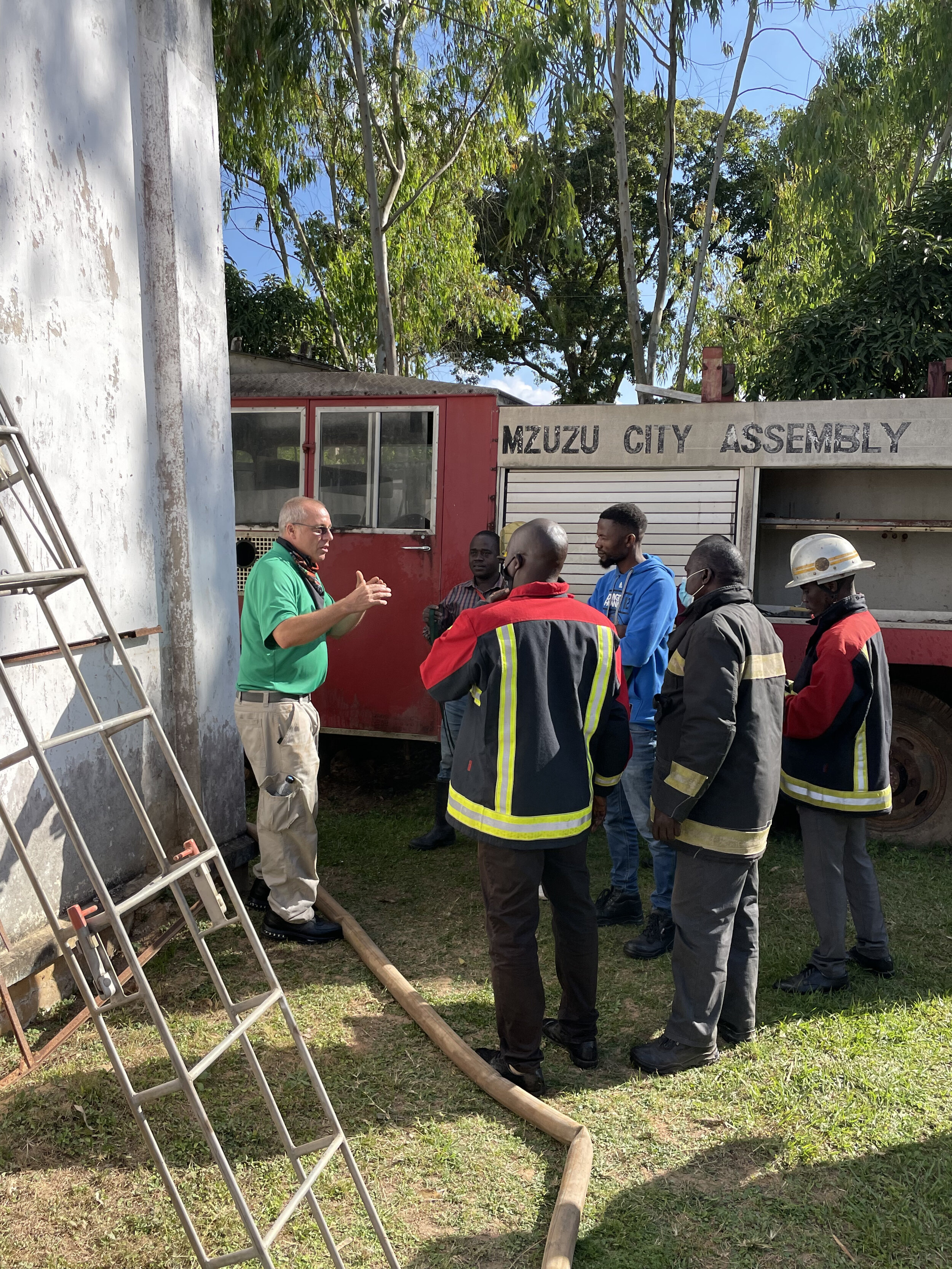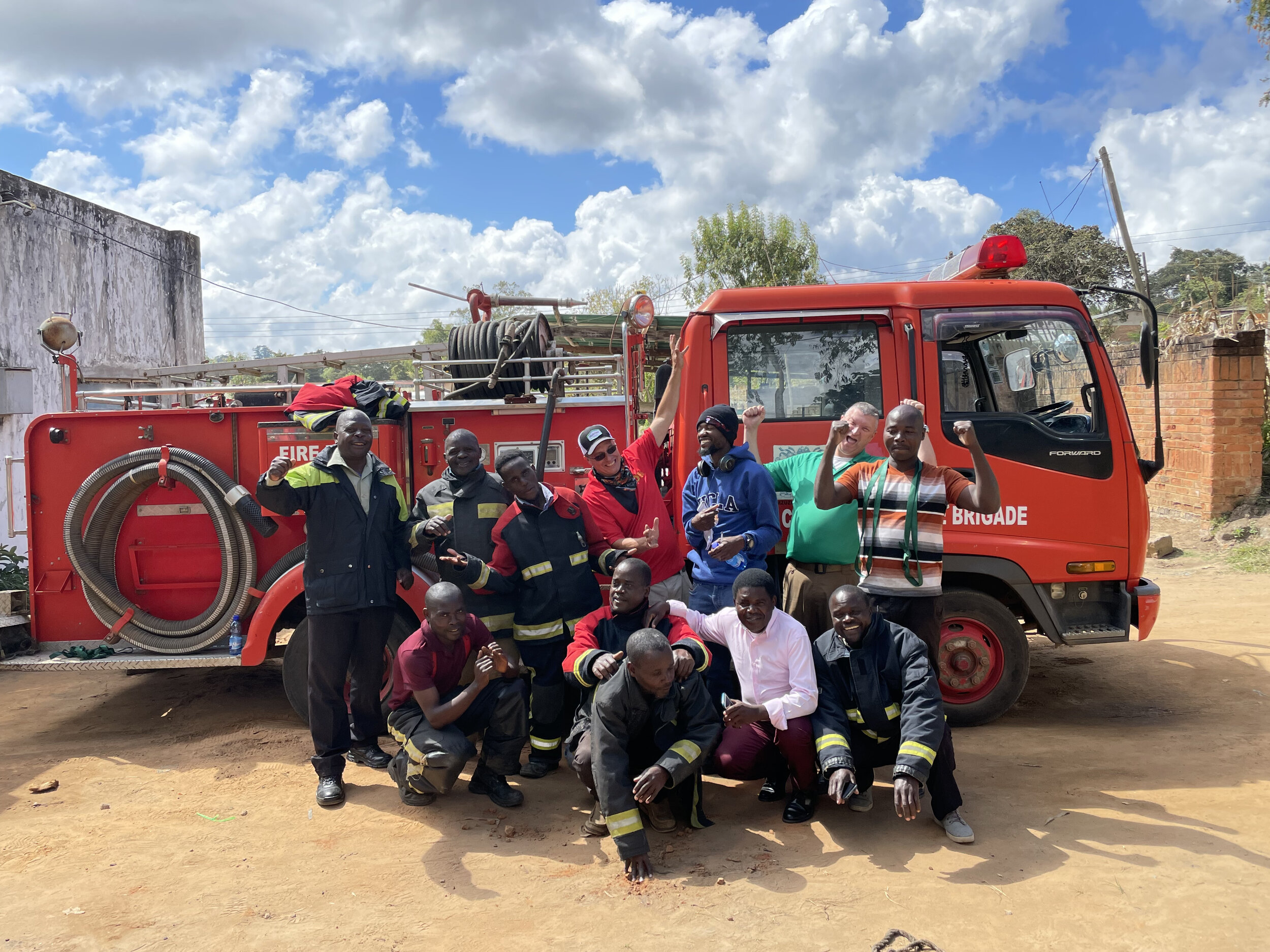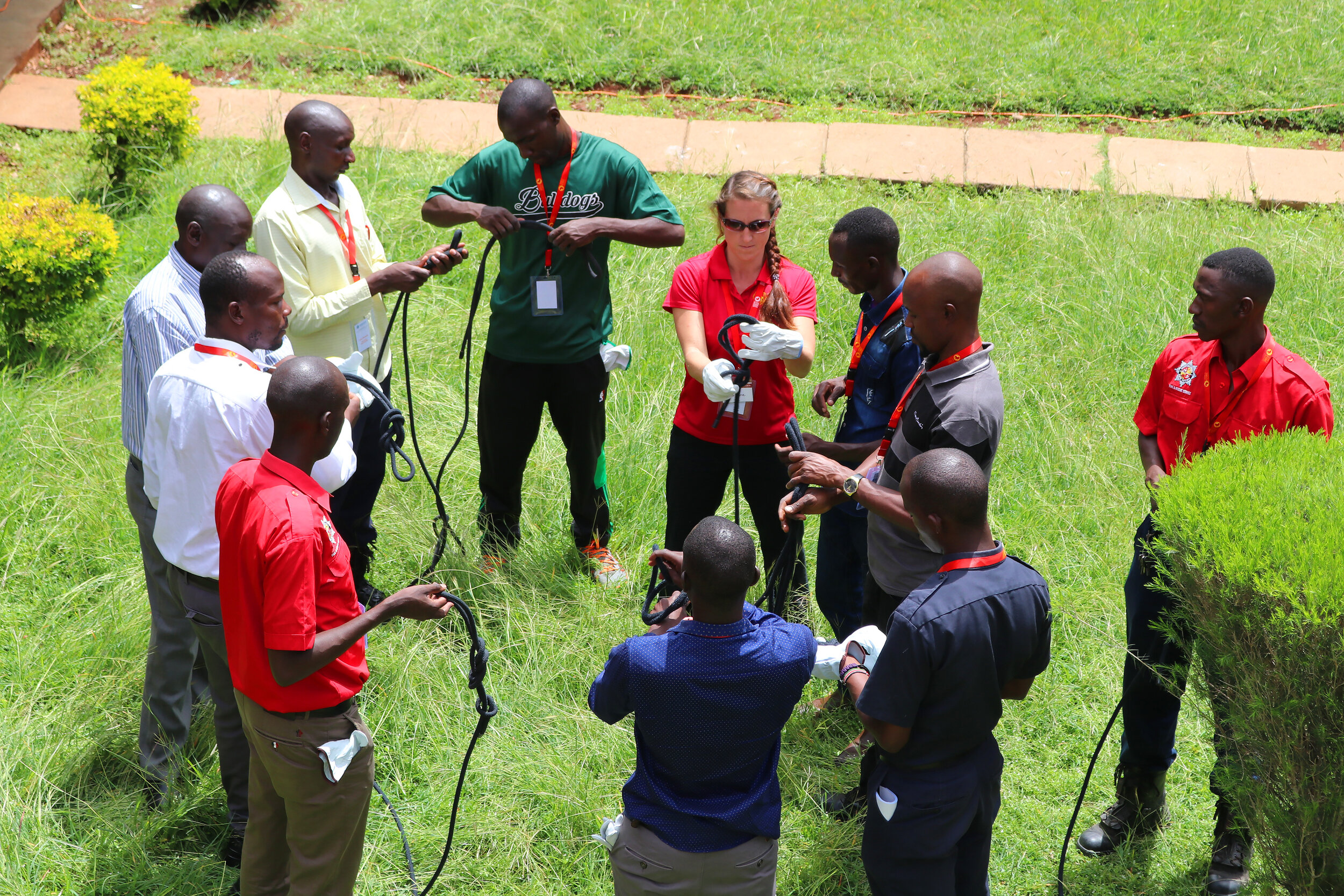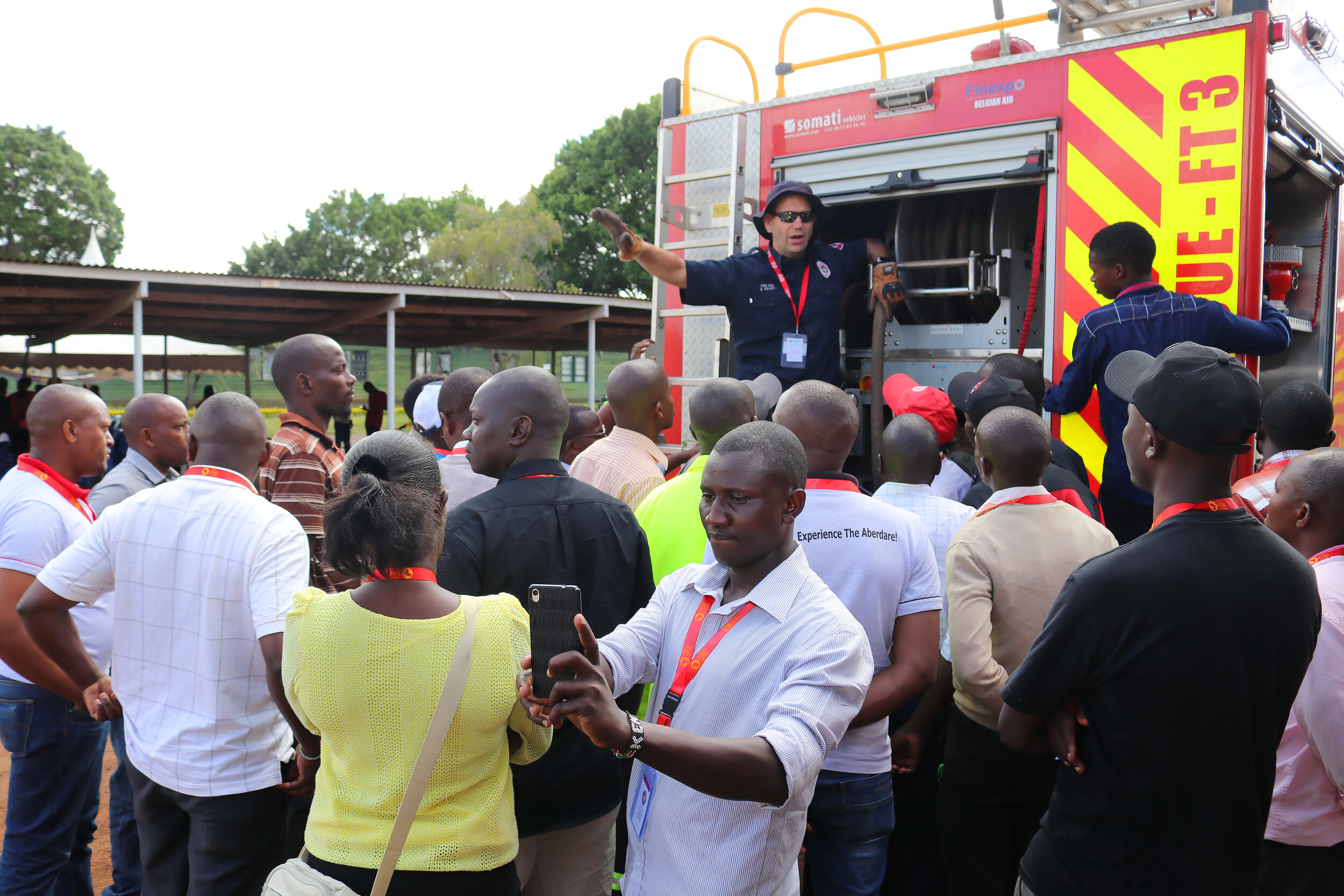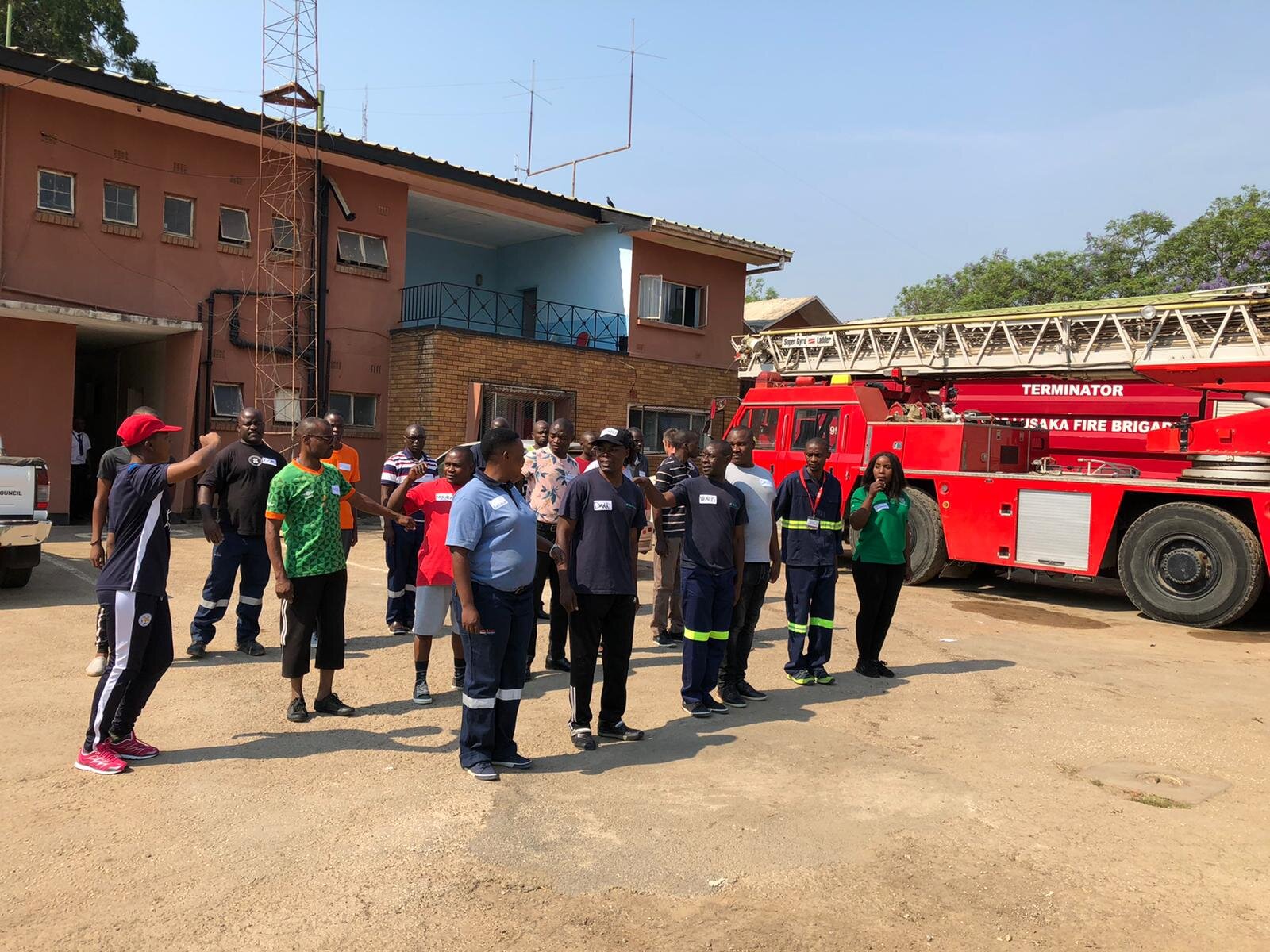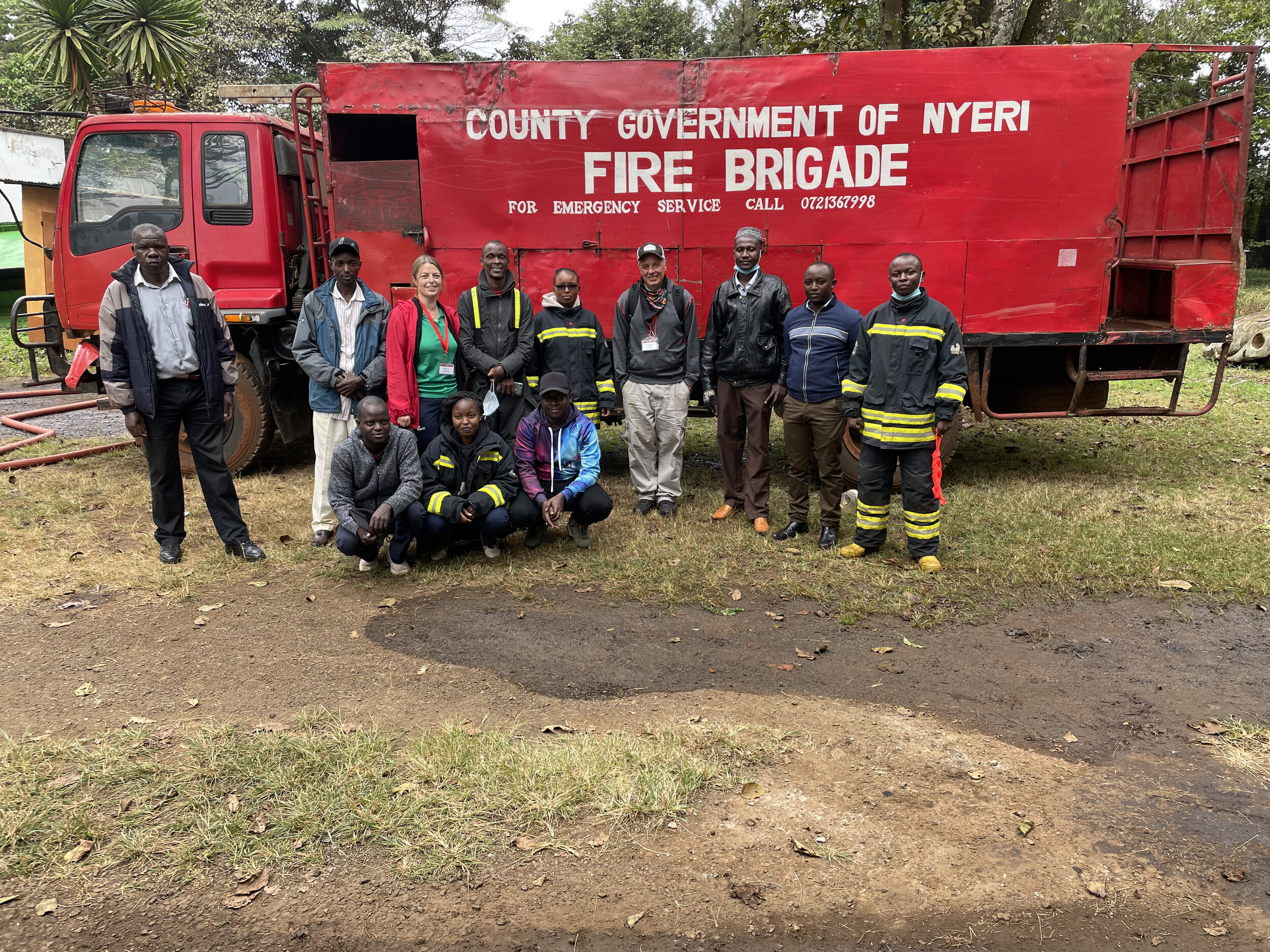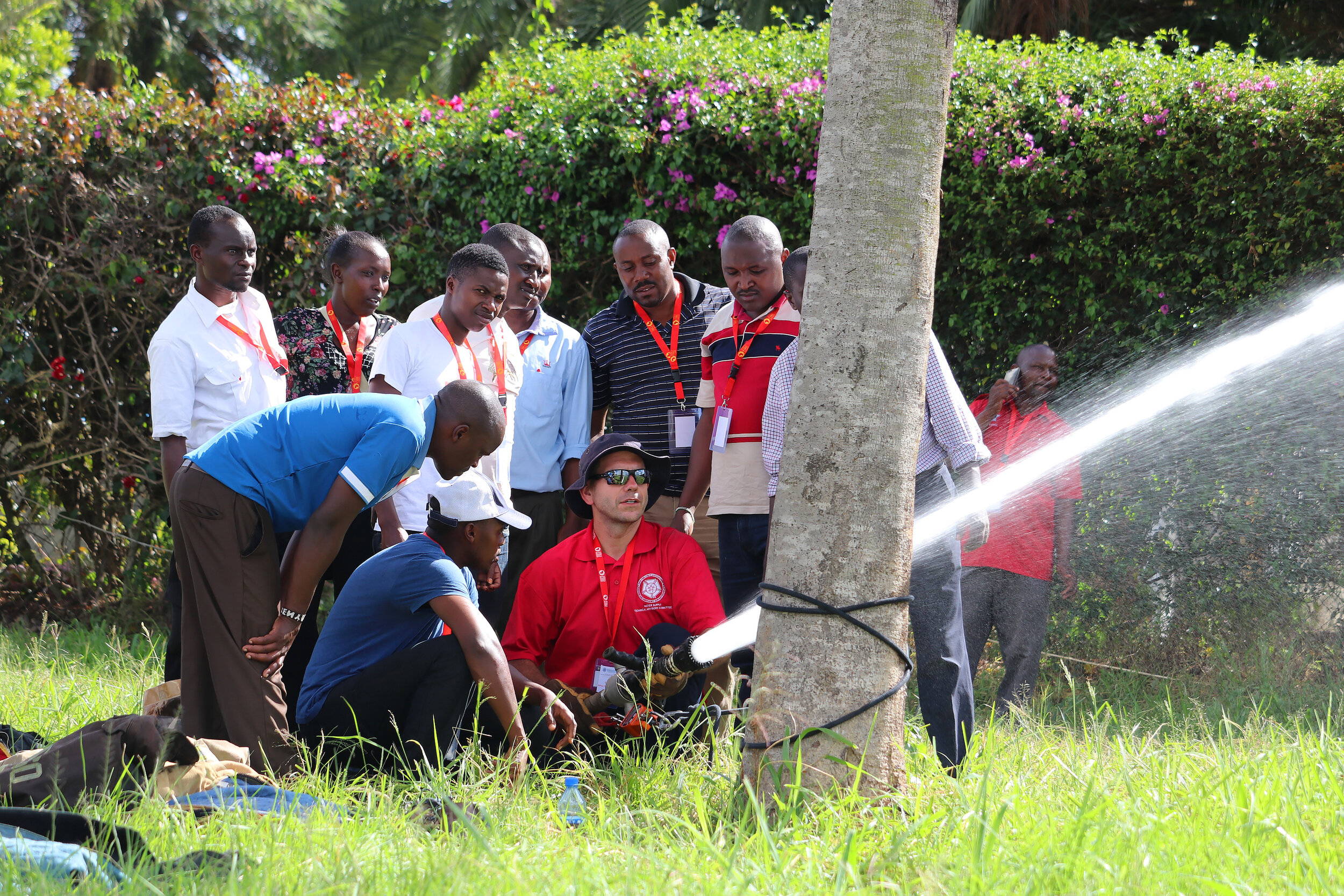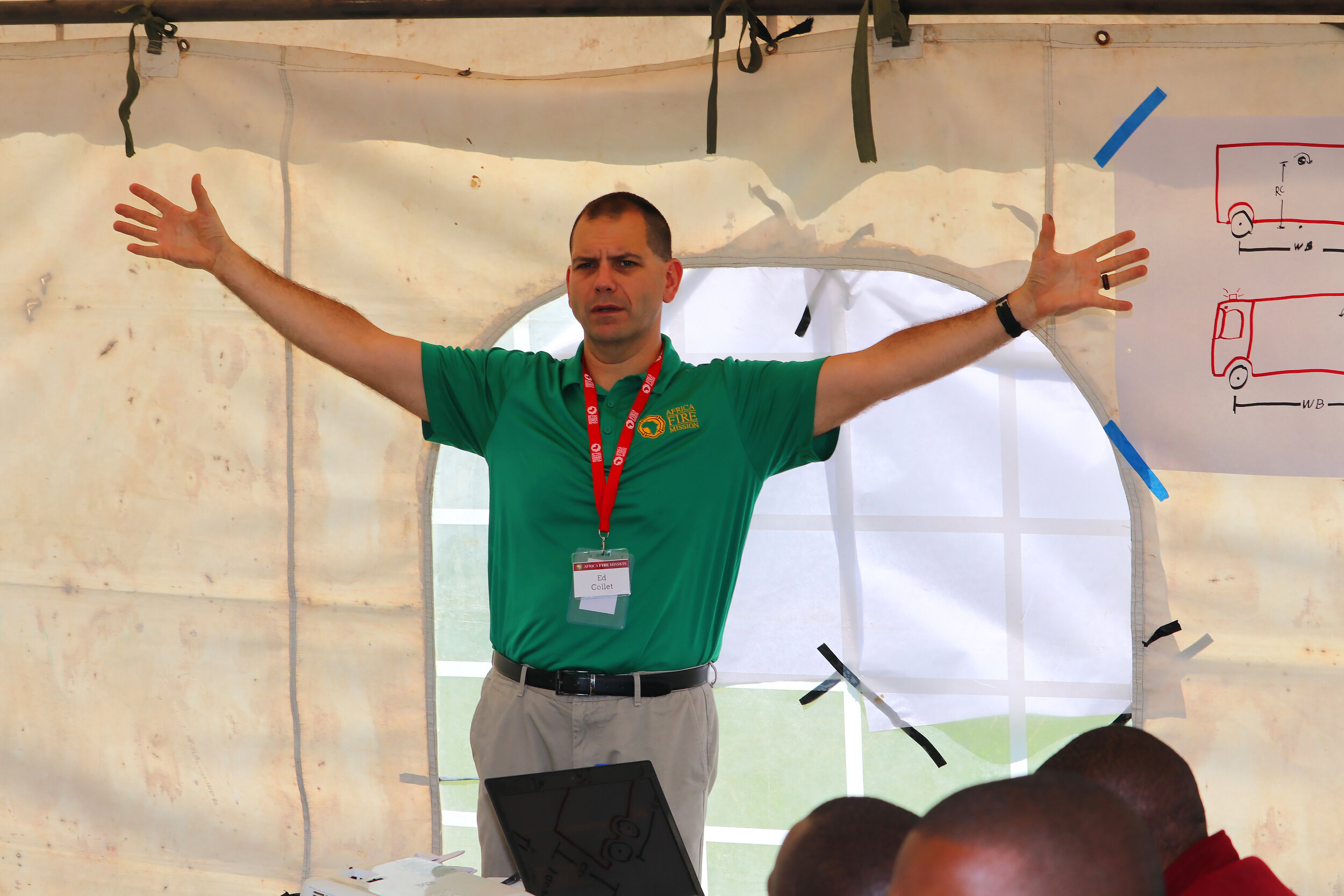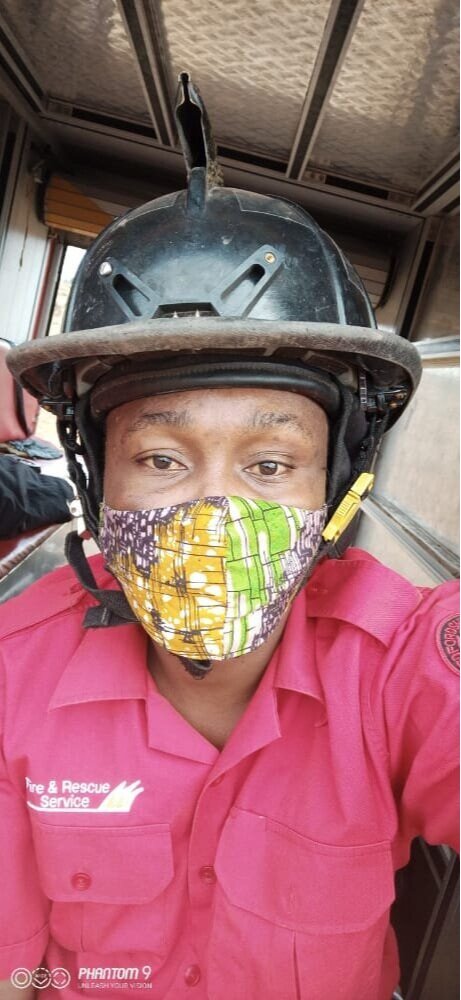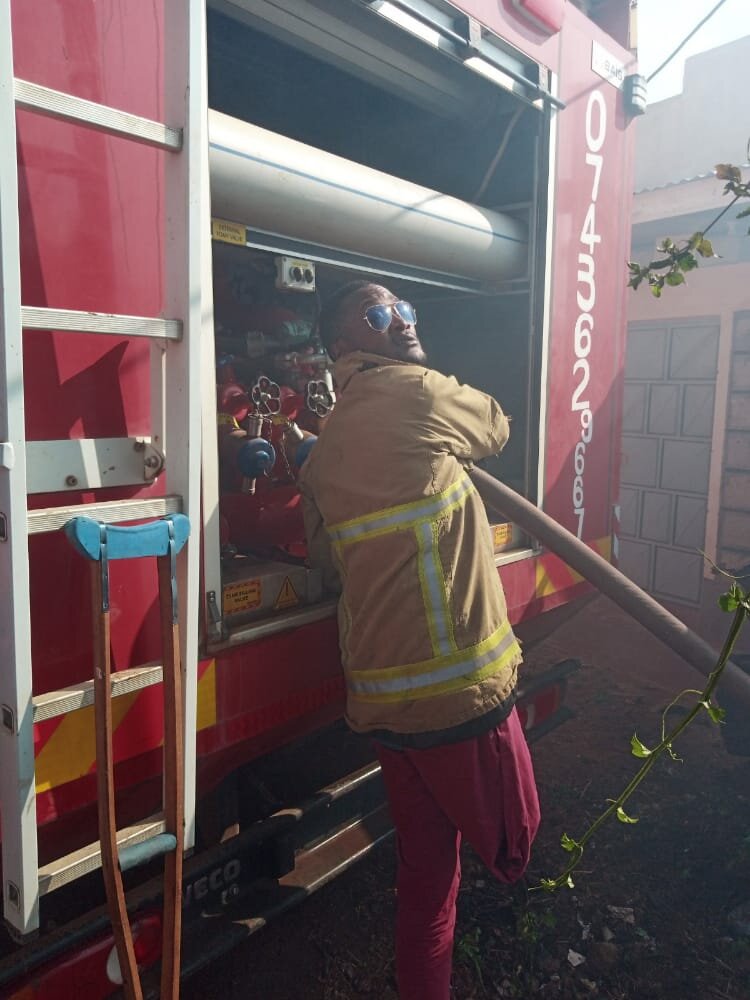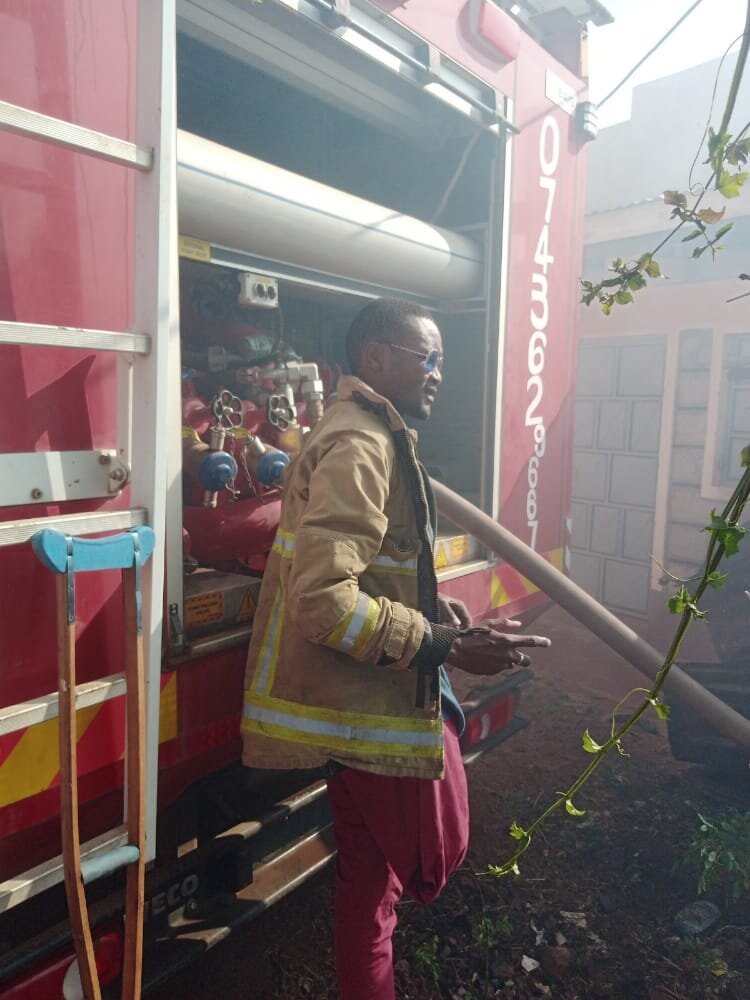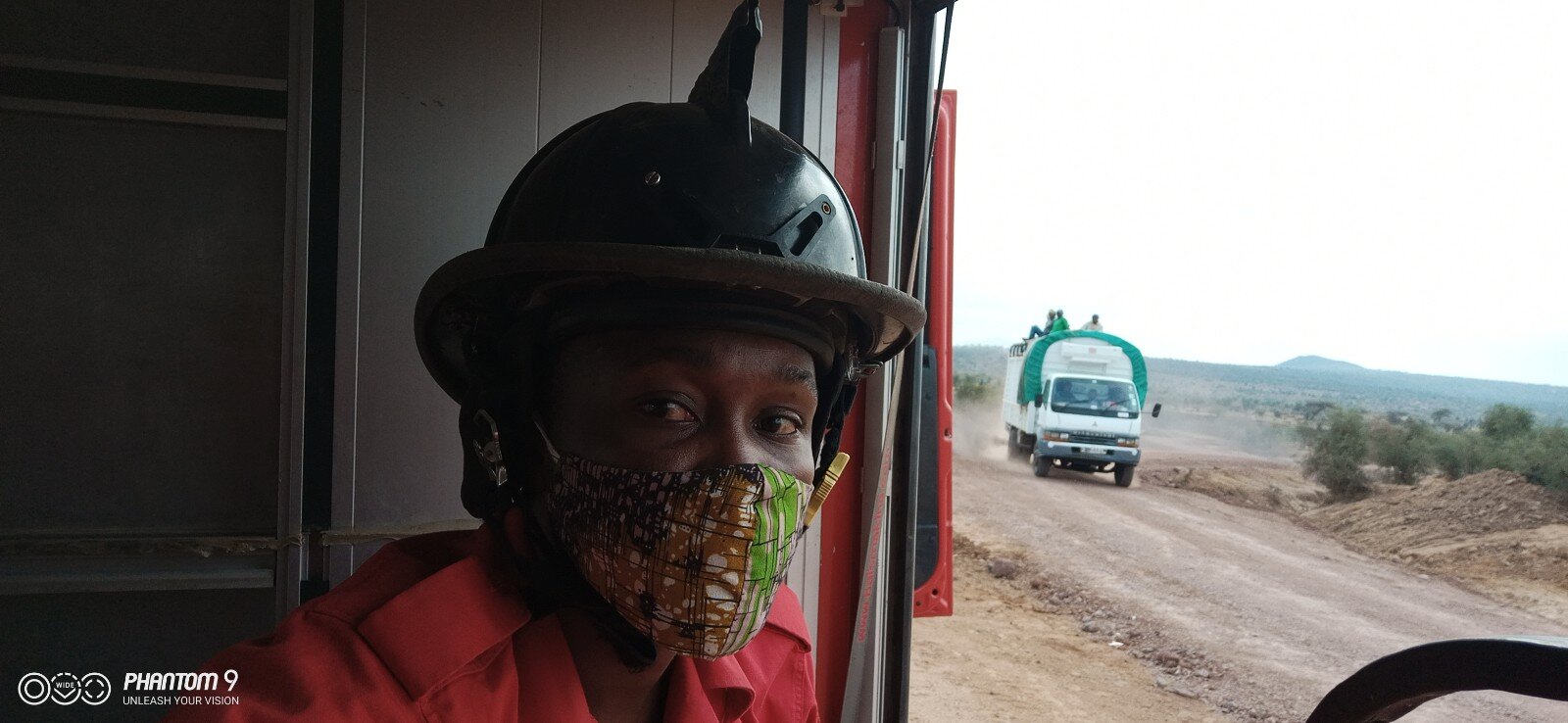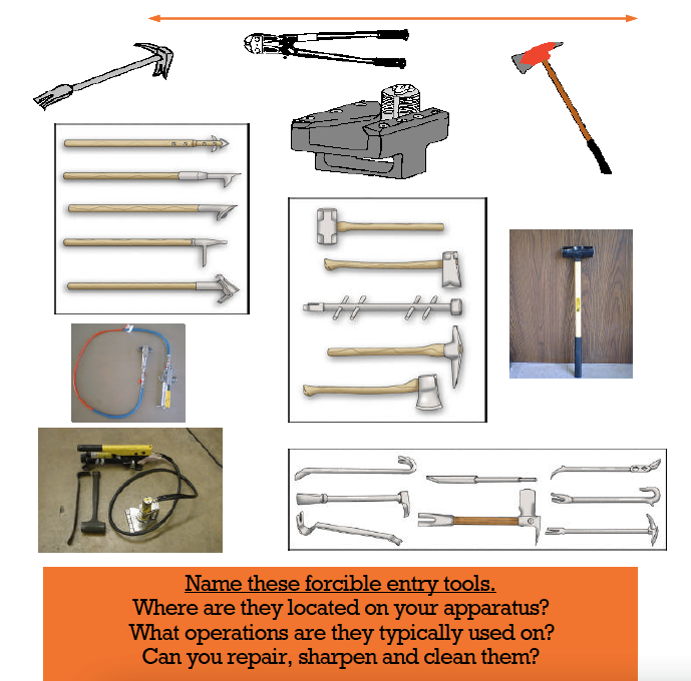Because of LION’s renewed and ongoing commitment to our programs, AFM is pleased to announce that we now have a second team member to work full-time in Africa! Errol Sianga is our newest team member. Based in Kenya, Errol has worked in communities and made a difference over the years as a Fire Safety Advocate Volunteer. He is well equipped to provide hands-on instruction and assist AFM with training, empowering, supporting, and encouraging communities across Africa.
Leadership Training in Kenya
The 2024 All Kenya EMS and Fire Symposium held at Jomo Kenyatta International Airport, Nairobi, Kenya integrated several fields of training. Fire Prevention, Health and Wellness, Firefighting Tactics, Emergency Medicine, and Leadership were all incorporated topics. AFM team member Tim Baker writes about his experience as a leadership instructor!
Growing Mental Wellness Programs
By Chief Mike Kull =- Programs Director, Africa Fire Mission
Africa FIre Mission held its annual All Kenay Fire and EMS Training Symposium in November 2024. AFM integrated discussions about mental health and wellness into all of the training classes that were offered. This topic is frequently requested and is especially relevant due to first responders being attacked while trying to lend assistance to the public during 2024 demonstrations in Kenya.
Mental health issues are often stigmatized, particularly among first responders and various communities across Africa, where such challenges are frequently perceived as signs of weakness. This stigma can lead first responders to fear ridicule or ostracism from their peers when confronting mental health or addiction problems. Such concerns are compounded by stories of alcohol abuse within the ranks of first responders, highlighting the urgent need for open dialogue and support.
To combat these stigmas, our training classes fostered a supportive environment where participants could learn, share, and hear the experiences of others. AFM’s instructors lead discussions and recounted their own journeys with mental health and wellness. This, facilitated open discussions that underscored the importance of mental wellbeing and talking about trauma and its impact. Wellness exercises, including mindfulness and physical exercise, were integrated into the program to promote holistic approaches to mental health.
Feedback from participants indicated that these interactions proved invaluable; one firefighter expressed gratitude to an instructor, sharing his battle with alcoholism and his triumph in achieving sobriety since the training began. Additionally, training participants reported that the sessions significantly broadened their understanding of the stress and trauma that first responders endure. Chief Fire Officers, expressed that they gained renewed insights into the struggles faced by their team members, affirming the need for continued support and open conversations surrounding mental health challenges in high-stress professions.
Recognizing the 2024 Kenya Fire and EMS Symposium Award Winners
In November, Africa Fire Mission worked with partners and collaborators around the world to hold the 2024 Kenya EMS and Fire Symposium and Competition. This Symposium featured firefighter and EMS trainings, leadership development, mental health awareness, community fire prevention trainings, and the signature EMS and Fire Competition. All of the classes were desinged to have immediate application for firefighters and EMS personel. AFM was espeically focused on leadership development in emergency services and the mental, physical, and spiritual wellness of first responders. AFM would like to recognize members of the fire service who are making a difference across Africa, as well as the award winners of the Fire and EMS Competition!
Africa Fire Mission Receives Motorola Solutions Foundation Grant
Africa Fire Mission (AFM) is pleased to announce that it has received a grant from the Motorola Solutions Foundation, the charitable arm of Motorola Solutions. AFM will use this grant to support the funding for our Fire and EMS Training Symposium and Personal Protective Equipment (PPE) Distribution in Kenya. This event serves as an incredible opportunity to train members of the fire service and develop leaders. AFM team members will also prioritize the mental wellness of first responders by continuing the development for health and mental wellness programs for emergency personnel.
Impacting Thousands - Stories from Kenya, September 2024
In September 2024, members of the AFM team travelled to Kenya on a Mission Trip. The goal of this trip was to teach fire prevention lessons to children, teachers, and other community members across Nairobi, Kenya. In just ten days, over 20,000 individuals were taught potentially life-saving fire prevention lessons and tips.
Press Release: AFM Receives Grant Award from the Laerdal Foundation for Stop the Bleed® Training Program
Africa Fire Mission (AFM) announces a grant award of $44,000 from the Laerdal Foundation for research to begin a Stop the Bleed® training program in Sub-Saharan Africa. The project will be led by Nancy Moore, MSW, LISW-S, Kirstin Henley, MD (Baylor College of Medicine), and Africa Fire Mission volunteers beginning November 2024 in Nairobi, Kenya.
Africa Fire Mission Receives Major Grant from Motorola Solutions Foundation
October 17, 2023
Africa Fire Mission Receives Major Grant from Motorola Solutions Foundation
Africa Fire Mission (AFM) is a Cincinnati-based non-profit organization with team members of firefighters, chief fire officers and other first responders from across the United States, Canada and Europe. For eleven years, AFM has provided fire training and equipment in various parts of Africa. AFM has announced they have received a $25,000 grant from the Motorola Solutions Foundation, the charitable arm of Motorola Foundation, to help continue its training programs and to provide a national Fire and EMS Training Symposium and Competition in Kenya in November 2023.
This grant will support hands-on Fire Training and distribution of firefighter personal protective equipment (PPE). In November, a team of thirty-five firefighters, EMT’s paramedics and other professionals from the United States will train over 500 Kenyan firefighters and EMT’s at the Jomo-Kenyatta International Airport in Nairobi, Kenya.
AFM’s training team members volunteer their time and pay their own expenses to travel to Africa to teach their fellow firefighters the latest techniques in firefighting, rescue and emergency medical services.
“Africa Fire Mission is grateful to Motorola Solutions Foundations for its continued support of our programs through this grant. It is because of dedicated volunteers and partners like Motorola Solutions Foundation that we are able to continue to impact communities and support firefighters in Africa as they strive to save lives and property” says Nancy Moore, Executive Director for Africa Fire Mission.
The Motorola Solutions Foundation, which has donated $100 million over the past 10 years, focuses its giving on three key areas: First responder programming, technology and engineering education, and programs that blend the two. The Foundation has a long-standing commitment to supporting programs that benefit underrepresented populations and aims to partner with organizations that align to its values of accountability, innovation, impact, diversity and inclusion.
"The Motorola Solutions Foundation is honored to partner with organizations like Africa Fire Mission that are actively driving positive change within the community," said Karem Pérez, vice president of Diversity, Equity and Inclusion and executive director of the Motorola Solutions Foundation. "We are immensely proud of the work that Africa Fire Mission is doing, and we look forward to seeing their continued impact."
For additional information on the Motorola Solutions Foundation grants program, visit: motorolasolutions.com/foundation-grant-partner.
For additional information regarding Africa Fire Mission visit: www.africafiremission.org - Contact Nancy Moore at 513-620-4236 or nancy@africafiremission.org
About Africa Fire Mission
Africa Fire Mission is a nonprofit organization committed to increasing the sustainable capacity of Fire Departments in developing communities. We accomplish this through training, empowerment, support and encouragement.
Train – We partner with governments, NGO’s, missionaries, schools and corporations to provide education and training to firefighters and local communities. We use Community Health Education to teach firefighters and community members in Africa to protect themselves from the dangers of fire. We provide fire prevention training and fire safety assessments to schools ensuring the students are able to learn in an environment safe from fires.
Empower – We work to increase the ability of communities in Africa to respond to disasters and provide relief when disasters occur.
Support – We provide personal protective equipment and communication tools to fire services throughout Africa to allow fire departments to operate in a safer and more coordinator manner.
Encourage – We build the capacity of African fire services so that local communities are able to provide sustainable public safety and disaster management services.
Where does AFM work?
Africa Fire Mission currently works throughout Africa including: Nigeria, Kenya, Malawi, and Zambia.
About the Motorola Solutions Foundation
As the charitable and philanthropic arm of Motorola Solutions, the Motorola Solutions Foundation partners with organizations around the globe to create safer cities and equitable, thriving communities. We focus on giving back through strategic grants, employee volunteerism and other community investment initiatives. Our strategic grants program supports organizations that offer first responder programming and technology and engineering education, and align to our values of accountability, innovation, impact, diversity and inclusion. The Foundation is one of the many ways in which the company lives out its purpose of helping people be their best in the moments that matter. For more information on the Foundation, visit: www.motorolasolutions.com/foundation
Celebrating our Volunteers!
On October 14, 2023 during our Annual Fundraiser, the Chama, Africa Fire Mission will honor volunteers Chief Bradley Banz and Chief Michael Kull.
Volunteer of the Year
Africa Fire Mission thrives on volunteers. Volunteers are at the heart of our organization. We have dozens and dozens of volunteers. We have volunteers from all across the North America, Africa and Europe that help allow AFM to serve on a daily basis. These men, women, firefighters, civilians and children are all a vital part of Africa Fire Mission being able to achieve its goals and objectives.
Chief Michael Kull – Volunteer of the Year
Chief Mike first joined Africa Fire Mission team in 2021 and has been all in with us ever since. Mike has participated in missions to Kenya and Malawi and facilitates AFM’s weekly virtual trainings. This past year, Mike stepped further into leadership co-leading our Malawi training trip! Mike just get’s it. He understands that the fire service in Africa is limited in physical resources and rich in people resources! Mike uses his creativity to help solve problems and helps the fire service advocate for what they need. This week we learned that the Zomba, Malawi fire brigade received its first uniforms from their local government as a result of the advocacy that their team learned from Mike. Mike’s dedication to facilitating our online trainings and lead to steady growth of our trainings from 60 participants a week at the beginning of 2023 to more than 100 participants a week now.
Mike fully embodies our mission to train, empower, support and encourage firefighters in Africa and his leadership has allowed us to continue to grow!
Thank you Mike for all that you have done for Africa Fire Mission! We are looking forward to serving with you for year’s to come!!
More about Chief Michael Kull: Chief Michael Kull is from Pennsylvania where he recently retired as the Fire Chief for the Valley Township Fire Department, Forest Fire Warden for Weiser State Forest and as a Township Supervisor for Valley Township. As a volunteer firefighter with over 25 years of experience, Michael has learned creative strategies for meeting his community’s needs for fire and rescue services.
Instructor of the Year
When Africa Fire Mission travels with a team to provide training in Africa or other parts of the world, our team members volunteer their time, talents and treasures to provide world class training to our partners. Our instructors undergo training in advance of the trip to prepare of the mission and prepare the lessons that they will teach in our week long fire training events. We are fortunate to have many instructors return year after year who continue to build each year on the training that they have been providing as well as to build strong relationships with firefighers and our overseas partners.
Chief Bradley Banz, Instructor of the Year
Chief Banz heard about AFM from our partner at Missions Of Hope International after providing CPR and first aid training there. Brad’s been involved with AFM since 2015. Brad has traveled with AFM on missions to Kenya, Zambia, and Malawi. Brad has been instrumental in the development of our Community Health Evangelism curriculum on Fire Prevention and Safety which has impacted millions of lives across Africa. Brad notices needs and responds making sure that curriculum developed for classes he teaches meet the needs of the fire service. This past year, he developed a Hazardous Materials class for firefighters in Africa after seeing the dangers firefighters were exposing themselves to attempting to respond to some Haz Mat incidents.
Brad encourages our team members and advocates for the firefighters. He takes time to get to know the firefighters we are serving and what their needs are. His heart for Africa is abundantly clear!
Thank you Brad for serving with heart and passion! We are grateful to have you on our team!
More about Chief Bradley Banz: Chief Banz is a firefighter with over 38 years of experience. Brad retired as a Captain for the Wichita, Kansas Fire Department and retired as Fire Chief from Colwich Kansas. Brad continues to serve his community as a volunteer firefighter in addition to training firefighters in Africa.
Interested in volunteering with AFM in administrative roles or as one of our international instructors?
Ambulance Services and Its Importance in Society
Ambulance Services and Its Importance in Society
By: Kelvin from Swift Emergencies Response Unit - Kenya
Increase in medical ailments has led to the rise in hospitals and emergency medical services assisting patients who require emergency medical assistance at critical moments, helping them to reach the hospital on time thus saving their life.
Private and public ambulance transport services are operating in more numbers today as an inevitable service providing care to critical patients at crucial moments. In Kenya, ambulance operating centers are set up at every hospital and private EMS organization. These Ambulance operating centers function with adequate ambulance transport services to offer immediate medical care for patients. Private ambulance transport services depict a consistent rise in the growth curve each year offering non-emergency services unlike hospital ambulance transport services which primarily function for emergency needs. Some of the non-emergency services include shifting patients from one hospital to another, transporting patients for any scanning or laboratory services to the relevant facilities, or patients with any travelling disabilities in normal vehicles to hospitals for treatments.
Emergency ambulance services are usually equipped with adequate medical equipment and paramedical professionals. Sometimes, non-emergency ambulance transport services are also equipped with some basic medical aids and a para medical staff to cater the needs of immediate medical care to patients.
Let us discuss a few points about the pre-hospital medical professions - paramedics and emergency medical technicians (EMTs) who are the spine of ambulance transport services:
Paramedics or EMTs are first treating patients even before doctors (pre-hospital care) thus saving patients through immediate medical procedures ensuring the vitals stable before reaching hospitals for further treatments.
Paramedics and EMTs are trained healthcare professionals, authorized to attend patients with required medications and procedures based on their training level.
Education level, standards, functions and skills of paramedics and EMTs vary with countries. However. certain standard functionalities remain common such as being trained to practice CPR procedures for cardiac arrest patients, usage of defibrillators, certain analgesic, paralytics and sedative medications for pain control, first aid to treat burns, fractures, childbirth complications, spine injury, airway management, blood control etc.
One should respect the noble service of prehospital providers who form an integral part of ambulance services.
The youth of our nation should involve themselves in such noble service, joining community life saving teams and can considering a career as a paramedic or EMT.
The government could benefit from taking initiatives to support volunteer community first responders at the community level and to empower them to continue saving lives at the scene before qualified personnel arrives.
Kenya Stairclimb 2023
Kenya Stairclimb 2023
On September 16, 2023, firefighters gathered for a day of remembrance of fallen firefighters and a day of camaraderie and awareness of the fire service in Kenya.
Heels on Mountains collaborated with Africa Fire Mission for this year’s Annual Firefighter Stairclimb event in Kenya, which had a had a total of 65 participants! We are grateful to all the participants and sponsors of this event.
Heels on Mountains has continuously supported firefighters in Kenya since 2019, supporting 4 stairclimb events for firefighters at the Kenya International Conference Center . Thank you to everyone that participated: Mombasa County, Kenya Airports Authority, ICT Fire and Rescue, West Pokot County. We are grateful to individual Firefighters and EMT’s as well as supporters of First Responders.
Asanti sana. You helped Kenya be on the map as the only African country that commemorated the Twin Tower bombings with a stair climb activity.
Check out photos from the Kenya Stairclimb event here:
Africa Fire Mission Supports Fire Service Development with White Papers
Africa Fire Mission Supports Fire Service Development with White Papers
by Nancy L. Moore, LISW-S, LCSW, CPCC, Executive Director and Co-Founder of AFM
It’s hard to believe that Africa Fire Mission has been working in Africa for over a decade. Since 2012, we have been working closely to provide training and consultation to the Fire Service in Africa. While our largest program is in Kenya, we have also worked directly in Zambia, Malawi, Ghana, Nigeria and Ethiopia. We have provided consultation or equipment in other countries across Africa as well.
As we support the fire service, we continue to look for ways that we can grow our impact. Our next step in supporting the African fire service in developing communities is by providing more advocacy resources that will help leaders in Africa to be able to support a well functioning fire service. In order to support our advocacy efforts, AFM is drafting white papers to help provide quality information for African leaders to support decision making with developing programs, making equipment purchases or accepting used equipment donations.
All too often AFM has seen situations when fire service leaders know what they need and have a hard time articulating the need or justifying the costs of quality programs and equipment to the government officials making the budgetary decisions. Our hope is to provide quality information that is designed to support these advocacy efforts.
Our first white paper is now available and addresses the need for a quality Breathing Apparatus Program. Let us know what you think. More importantly, please utilize the white paper as a tool for advocacy when you need support!
Recognizing our Volunteers
On October 22, 2022 during our Annual Fundraiser, the Chama, Africa Fire Mission was pleased to honor Judy Johnson and Howard Cohen.
Africa Fire Mission thrives on volunteers. Volunteers are at the heart of our organization. We have dozens and dozens of volunteers. We have volunteers from all across the North America, Africa and Europe that help to make AFM run on a daily basis. These men, women, firefighters, civilians and children are all a vital part of Africa Fire Mission being able to achieve its goals and objectives.
Judy Johnson – Volunteer of the Year
Judy has been critical to helping developing AFM into the organization that it is today. Judy was the person who introduced Dave and Nancy to Missions of Hope International and she was instrumental in ensuring that we had a solid plan for taking team members to Africa - from training team members to helping to write our application Judy prepared us to do the work we do. As a board member to AFM, Judy has helped to ensure that AFM was connect with other organizations around the world so that we can collaborate with others to do our work.
Thank you Judy for all that you have done for Africa Fire Mission! We hope you’ll continue to enjoy your retirement!
When Africa Fire Mission travels with a team to provide training in Africa or other parts of the world, our team members volunteer their time, talents and treasures to provide world class training to our partners. Our instructors, undergo training in advance of the trip to prepare of the mission and prepare the lessons that they will teach in our week long fire training events. We have been fortunate to have many instructors return year after year and continue to build each year on the training that they have been providing as well as to build strong relationships with firefighers and our overseas partners.
Howard Cohen, Instructor of the Year
Howard has been pivoting and helping to grow AFM since he signed up for his first trip in 2020 - which turned into a virtual trip/training. Howard then went to Kenya with AFM in 2021 and signed up to coordinate our weekly online trainings. With Howard’s leadership and planning, we have grown from an average of 16 participants a week in 2021 to 65 weekly participants in 2022! Howard is headed back to Kenya with AFM in November 2022 and is looking forward to reconnecting in person with those he has been building relationship with. Check out what Howard has to say about being part of AFM below!
Interested in volunteering with AFM in administrative roles or as one of our international instructors?
Africa Fire Mission Receives Major Grant from Motorola Solutions Foundation
For Immediate Release
August 29, 2022
Africa Fire Mission Receives Major Grant from Motorola Solutions Foundation
Africa Fire Mission (AFM) is a Cincinnati-based non-profit organization with team members of firefighters from across the United States, Canada and Europe who for ten years have provided fire training and equipment in various parts of Africa. AFM has announced that they have received a $25,000 grant from the Motorola Solutions Foundation to help continue its training programs and to provide a national Fire and EMS Training Symposium and Competition in Kenya in November 2022.
This grant will support hands-on Fire Training and distribution of firefighter personal protective equipment (PPE). In November, a team of twenty-two firefighters, paramedics and nurses from the United States and Canada will train over 350 Kenyan firefighters and EMT’s at the Jomo-Kenyatta International Airport in Nairobi, Kenya.
AFM’s training team members volunteer their time and pay their own expenses to travel to Africa to teach their fellow firefighters the latest techniques in firefighting, rescue and emergency medical services.
“Africa Fire Mission is grateful to Motorola Solutions Foundations for its continued support of our programs through this grant. Through continued partnership, we will be able to continue to impact communities and support firefighters in Africa as they strive to save lives and property” says Nancy Moore, Executive Director for Africa Fire Mission.
The Motorola Solutions Foundation, which has donated $100 million over the past 10 years, focuses its giving on three key areas: first responder programming, technology and engineering education, and programs that blend the two. The Foundation has a long-standing commitment to supporting programs that benefit underrepresented populations and aims to partner with organizations that align to its values of accountability, innovation, impact, diversity and inclusion.
The Motorola Solutions Foundation is proud to partner with organizations like Africa Fire Mission that share our values and passion for driving positive change in the community,” said Karem Perez, Executive Director of the Motorola Solutions Foundation. “We believe in the work that Africa Fire Mission is doing and look forward to seeing their continued impact.
For additional information on the Motorola Solutions Foundation grants program, visit: motorolasolutions.com/foundation-grant-partner.
For additional information regarding Africa Fire Mission visit: www.africafiremission.org - Contact Nancy Moore at 513-620-4236 or nancy@africafiremission.org
About Africa Fire Mission
Africa Fire Mission is a nonprofit organization committed to increasing the sustainable capacity of Fire Departments in developing communities. We accomplish this through training, empowerment, support and encouragement.
· Train – We partner with governments, NGO’s, missionaries, schools and corporations to provide education and training to firefighters and local communities. We use Community Health Education to teach firefighters and community members in Africa to protect themselves from the dangers of fire. We provide fire prevention training and fire safety assessments to schools ensuring the students are able to learn in an environment safe from fires.
· Empower – We work to increase the ability of communities in Africa to respond to disasters and provide relief when disasters occur.
· Support – We provide personal protective equipment and communication tools to fire services throughout Africa to allow fire departments to operate in a safer and more coordinator manner.
· Encourage – We build the capacity of African fire services so that local communities are able to provide sustainable public safety and disaster management services.
Where does AFM work?
Africa Fire Mission currently works in 6 countries throughout Africa including: Ethiopia, Ghana, Kenya, Malawi, Sierra Leone, and Zambia. In 2022, we are expanding our consultation work into Nigeria. In 2018, a request to expand our services into Ukraine has led us outside of Africa and into Europe.
About the Motorola Solutions Foundation
As the charitable and philanthropic arm of Motorola Solutions, the Motorola Solutions Foundation partners with organizations around the globe to create safer cities and equitable, thriving communities. We focus on giving back through strategic grants, employee volunteerism and other community investment initiatives. Our strategic grants program supports organizations that offer first responder programming and technology and engineering education, and align to our values of accountability, innovation, impact, diversity and inclusion. The Foundation is one of the many ways in which the company lives out its purpose of helping people be their best in the moments that matter. For more information on the Foundation, visit: www.motorolasolutions.com/foundation
Experiencing Kenyan Firefighting First Hand
by Josh Bardwell, Glimer Texas
As an American firefighter, I have always had some level of awareness of how fortunate I have been to have decent equipment, funding, and training provided to me in my volunteer and career fire agencies. With that said, I have oftentimes fallen into the all-to-common quagmire of being jealous of what other departments or agencies have that mine did not and feeling a level of frustration that I now feel guilty of. Sure, my home department and agency could enhance our response capabilities with more funding and training than we have, but after my time in Kenya with Africa Fire Mission (AFM) I realize that I have had it pretty darn good.
I came home from Kenya with a renewed perception of the fire service as a whole and the part I play in it thanks to the camaraderie of my fellow AFM instructors and the selfless students we met.
From walking through the Nairobi slums that are prone to fatal fires, to sitting on a football pitch discussing Wildland Urban Interface issues with our students, it quickly became apparent that many of our Kenyan counterparts are dealing with fire service issues that we rarely encounter in the United States. Pre-trip research prepared me to address typical firefighting issues like unreliable water supplies, staffing deficits, need for pre-planning for incidents, and implementing public outreach programs.
In less than two days in-country conversing with our Kenyan colleagues, I was exposed to the hard truth: that most of those firefighters face more danger from the public than the fire itself. While American firefighters are typically revered as local heroes and ranked as one of the most trusted professions, our Kenyan colleagues are not afforded the same level of public trust. This issue is complex stemming from national politics, creating a public distrust of government employees and a history of fatal fires, with delayed emergency response due to staffing shortages, no timely report of an incident, congested highways, lack of building codes, etc. Despite numerous tales of fire engines being stoned, fire hoses being cut and firefighters being assaulted, these brave Kenyan firefighters show up every day to do their duty. It was incredibly humbling to see their devotion to the firefighting profession override their fear of harm.
One of the things every firefighter is told is to never stop learning and refine their craft in the fire service. From structural to wildland, firefighters in the United States should be accustomed to cheap and readily available in-house, regional and virtual courses to build on their current skillset and qualifications. Often times we take for granted the ease of accessibility and cost efficient classes we have at our disposal. Talking to our students at the symposium, we learned that many of them traveled from hundreds of kilometers away on their own dime, cramming into single-cab fire engines or even hitching rides from the public traveling to the capital. Once in Nairobi, some even camped out because they couldn’t afford lodging. Despite the hardships in travel and lodging, many consistently showed up everyday to learn new skills and to take that knowledge back to their fire brigades across the country. From initial introductions to the capstone live-fire exercise five days later, we were inundated with questions and real-world scenario situations from our students looking for more than book answers; they wanted our personal advice and it challenged us to step into their shoes and look at things in a different perspective. These questions ran the gamut of what to do about dangerous wildlife encounters on a wildfire to troubleshooting equipment issues without parts available. They were hungry to learn and open to thinking outside of the box. I found myself redirecting questions back to them to spur discussions, which helped getting these firefighters from different regions to begin collaborating. By the end of it, we were all fellow students learning from each other. I found that I probably learned more from the Kenyans than they learned from me, and that’s ok.
After being home for a few weeks and back on the job, I am recognizing a few personal changes that I can contribute to my AFM journey. The biggest, and probably the most natural one, is recognition that we have too much frivolous stuff compared to people in the developing world. My wife and I have already begun culling out things we do not use or wear, attempting to scale back our purchasing, and reduce eating out as much. Another big change for me has been reevaluating what training we do (or have not been doing) at my local volunteer fire department and state fire agency. From back-to-the-basics fire tactics to trauma response, we have to maximize our efforts refining our craft so we can provide the best service possible to the public, every time. The third big change has been a renewed sense of brotherhood/camaraderie throughout the fire service and recognition that everyone from volunteer to career, structural to wildland, and Kenyan to Kansan has their place in this profession and something to contribute. We are all in this together and hopefully striving with the same sense of duty, respect and integrity to do the job to best of our ability. If we can maintain that, then we might just be able to make some citizen’s worse day just a little bit better when we serve.
I encourage anyone, no matter your years of service, rank, title, or status to consider attending an AFM trip in the future, because you will find that you have something to offer and you will definitely come away better for it.
AMBULANCE SERVICES AND THEIR IMPORTANCE IN SOCIETY
By Kelvin, Seru Kenya EMR
An increase in medical ailments has led to the rise in hospitals and emergency medical services. These services assist patients who require emergency medical assistance at critical moments, helping them to reach the hospital on time and thus saving their life.
Private and public ambulance transportation services are operating in large numbers today to serve patients in critical condition.
Ambulance operating centers are set up at every hospital and private EMS. These operating centers function with adequate ambulance transportation services to offer immediate medical care for patients. Private ambulance transportation services depict a consistent rise in the growth curve each year offering non-emergency services, unlike hospital ambulance transportation services which primarily function for emergency needs.
Some of the non-emergency protocols include shifting patients from one hospital to another, transporting patients for any scanning or laboratory services to the relevant facilities, and having patients with traveling disabilities ride in normal vehicles to hospitals for treatments.
Emergency ambulance services are usually equipped with adequate medical equipment and paramedical professionals. Sometimes, non-emergency ambulance transportation services are also equipped with some basic medical aids and paramedical staff to cater to the needs of immediate medical care to patients.
HERE ARE A FEW THINGS TO KNOW ABOUT PARAMEDICS, WHO ARE THE BACKBONE OF AMBULANCE TRANSPORTATION SERVICES.
1) Paramedics or paramedical professionals are the first to treat patients, even before doctors. They save patients through immediate medical procedures ensuring the vitals are stable before reaching hospitals for further treatments.
2) Paramedics are trained healthcare professionals and sometimes have equivalent training to doctors. They can be authorized to assist patients with required medications and procedures.
3) Paramedics roles were established before World War I and their services were mostly rendered to soldiers on the battlefield. In those days their function was closely associated with the military. Later, ambulance services with paramedics were put into function to offer immediate medical care for civilians as well.
4) Education level, standards, functions, and skills of paramedics vary by country. However, certain standard functionalities remain common. Such as being trained to practice CPR, procedures for cardiac arrest patients, usage of defibrillators, certain analgesic, paralytics, sedative medications for pain control, first aid to treat burns, fractures, childbirth complications, spine injury, airway management, blood control, etc.
6) Paramedics and physiotherapists have one of the noblest professions in Kenya Africa and the world at large. Earlier physiotherapy did not gain as much recognition as today where physiotherapists are looked at as saviors offering treatments as an alternate to surgical procedures in most of the cases and post-surgery maintenance for a quick recovery to a normal lifestyle.
7) One should respect the noble service of pre-hospital providers who form an integral part of ambulance services.
8) The youth of our nation should get involved in such noble services by joining community life-saving teams and getting careers rather than wasting their resource and potential indulging in unwise activities.
9) Moreover, the government should take initiatives to support the volunteer first responders at the community level and to empower them to continue saving lives at the scene, before qualified personnel arrives.
WHY SHOULD BOTH A FIRE TRUCK AND AN AMBULANCE ALWAYS SHOW UP FOR A MEDICAL EMERGENCY?
When a call comes in, dispatchers often are not given precise or complete information.
As such, units are dispatched ready for the worst-case scenario. To ensure the highest level of care, the closest fire engine station is dispatched, and EMS sends an ambulance (staffed with two paramedics).
No medical call is “routine.” At a minimum, most emergencies require assessing the patient, obtaining their vital signs, providing oxygen therapy, and moving them.
EMS may also need to place an advanced airway, administer drugs intravenously, or monitor cardiac conditions. All of these procedures are completed more efficiently when the appropriate amount of help is on the scene.
Efficient care is our goal, and it is often the difference between life and death.
Unfortunately, units have no way of knowing what they will encounter on a call until they arrive. They work in a “what if” and “all-risk” business.
Responding to the unknown is public safety.
Emergency hotlines are your instant go-to when the need arises. That’s why it is important that you keep a copy of each of the important ones with you.
Africa Fire Mission Receives Major Grant from Motorola Solutions Foundation
For Immediate Release
September 28, 2021
Africa Fire Mission Receives Major Grant from Motorola Solutions Foundation
Africa Fire Mission (AFM) is a Cincinnati-based group of firefighters from across the United States who for nearly a decade have provided fire training and equipment to several African nations. AFM has announced that they will receive a $ 30,000 grant from the Motorola Solutions Foundation to help continue its outreach to train several fire brigades in Kenya, Malawi, and Zambia through 2022.
This grant will support hands-on Fire Training and distribution of personal protective equipment (PPE) turnout gear scheduled for delivery in Kenya, Malawi and Zambia. The 2021 Kenya trip that will take place from November 10th to 21st, will be partially supported by this grant, as well as four other scheduled team trips in 2022.
This distribution of needed fire equipment and training is only possible through the generosity of such organizations as the Motorola Solutions Foundation funded through the Motorola Corporation, a world-wide leader in the field of emergency communications equipment. The AFM training staff consists of firefighters from departments that span across America, who volunteer their time and pay their own expenses to travel to Africa to teach their fellow firefighters the latest techniques in firefighting, rescue and emergency medical services.
“Africa Fire Mission is grateful to Motorola Solutions Foundations for its continued support of our programs through this grant. We will be able to continue to impact communities and support firefighters in Africa as they strive to save lives and property” says Nancy Moore, Director of Programs for Africa Fire Mission.
AFM is a 501c3 corporation headquartered at 1373West Galbraith Road in North College Hill, Ohio.
Each year, the Motorola Solutions Foundation’s awards grants to charitable organizations such as Africa Fire Mission to support three primary areas of focus: first responder programming, technology and engineering education and programs that blend the two.
"The Motorola Solutions Foundation aims to partner with organizations that align to our values of accountability, innovation, impact, diversity and inclusion," said Karem Perez, executive director of the Motorola Solutions Foundation. "We are proud to support organizations like Africa Fire Mission that embody these values while driving positive change in their communities.”
For additional information:
Motorola Solutions Foundation grants program: www.motorolasolutions.com/foundation - Contact Sarah Packard at sarah.packard@motorolasolutions.com
Africa Fire Mission: www.africafiremission.org - Contact Nancy Moore at 513-620-4236 or nancy@africafiremission.org, or Robert Rielage at 513-728-9978.
Boots on the Ground: Recognizing our Volunteers
On September 25, 2021 Africa Fire Mission during our Annual Fundraiser, the Chama, Africa Fire Mission was pleased to honor Shandy Seastone and Ed Collet.
Africa Fire Mission thrives on volunteers. Volunteers are at the heart of our organization. We have dozens and dozens of volunteers. We have volunteers from all across the United States, Africa and Europe that help to make AFM run on a daily basis. These men, women, firefighters, civilians and children are all a vital part of Africa Fire Mission being able to achieve its goals and objectives.
Shandy Seastone – Volunteer of the Year
Shandy has been helping to prepare AFM’s team for travel for 3 years. She convinced her husband Jon to come to Africa in 2017 while he was gone, started recruiting other firefighters in the Denver, CO area. Shandy helps to connect interested team members to AFM, assists with orientation and overall communication to the team.
Thank you Shandy for all that you have done and all that you will do for Africa Fire Mission and those that we serve around the world.
When Africa Fire Mission travels with a team to provide training in Africa or other parts of the world, our team members volunteer their time, talents and treasures to provide world class training to our partners. Our instructors, undergo training in advance of the trip to prepare of the mission and prepare the lessons that they will teach in our week long fire training events. We have been fortunate to have many instructors return year after year and continue to build each year on the training that they have been providing as well as to build strong relationships with firefighers and our overseas partners.
Ed Collet, Trainer of the Year
After traveling to Kenya with AFM in 2019 to train firefighters in water supply, Ed was disappointed that we couldn’t go to Kenya in 2020. He was watching his wife, Jill, a school administrator, transition students and teachers to virtual classrooms and called Nancy to say - hey we need to do a virtual academy. That idea lead to 20 instructors providing classes to over 600 students from 19 countries - online! Ed is headed back to Kenya with AFM in November 2021 and has made plans to help advance what he started 2 years ago. Ed said: “We don’t accomplish any of this alone. We always have people helping us. That’s ultimately our whole goal at AFM. We support the firefighters in Africa so they can do this on their own, and we are there as their support.”
Interested in volunteering with AFM in administrative roles or as one of our international instructors?
Meet Firefighter Kennedy
by Nancy Moore
I traveled to Isiolo, Kenya in July 2021, our Fire Safety Advocate, Jose and with Raphael and Steve from Missions of Hope International. It was finally time to meet with Fire Chief Wako and see face to face the young fire brigade in Northern, rural Kenya. They have formed a new fire brigade and are less than three years old.
While we were getting to know the firefighters there we noticed Kennedy. He stood out with a friendly grin and a confident presence. He also stood back - tucked behind some of the other fire fighters. José noticed right away that Kennedy had an amputated leg. As we talked with Kennedy and Chief Wako we learned that Kennedy was in a motor bike accident that resulted in the injury that led to his leg being amputated - while he was in the process of becoming a firefighter.
Chief Wako said he could see the spirit that Kennedy had and decided that he could use Kennedy on his team - in spite of his amputation. Kennedy serves as the Isiolo Fire Brigades Public Information Officer, Pump Operator and supports his team in any way he can. He wants to be fully restored to serve his community.
Will you help Africa Fire Mission by supporting this project to help get Physical Therapy and a Prosthetic for Kennedy? We are raising $10,000 to help make Kennedy’s dreams for serving his community come true!
Read Kennedy’s story in his own words:
“I applied for a vacancy of fire when I saw that advert on daily nation newspaper on August 2018 being complete with my two legs. I applied because I had passion for helping the community by fighting fire. I was given an interview in November 2018. I attended the interview and in February 2019 I received an appointment letter to report as a firefighter on 15 April 2019.
My accident occurred between my the day of picking my appointment letter and that period of reporting to my working station.
The accident was a rare accident, I was on motorbike and it happened to get a mechanical issues and we had fell into a drainage furrow. I got a normal fracture of the bone of my right leg. I was rushed to the Isiolo Referral Hospital where things turned to be worse. The doctors in charge of orthopedic messed up with my leg and the blood stopped circulating in my right leg after they put on plaster which was too tight. This resulted in the nerves not to function.
I had hoped to be transferred to one hospital but due to lack of funds I was unable to go. Later on I was transferred to a mission hospital. Things turned to be worse and worse after everyday. So there wasn't any alternative since my leg started getting worse and got rotten. I was in bad condition almost died.
It reached a point where one of the doctors came and advised me, instead of you loosing your life whereas you can get amputated and life be as normal as possible. I accepted the amputation and that things would be as normal as before even if I would not be having one leg.
So that's how I accepted for the amputation and life continued and I reported to job even if I reported late than others due to the recovering period.
So I went to work. Chief Wako shifted me to the office as an IcT manager of the fire dept of Isiolo. Sometimes I also help with pump operations and I do it to my level best regardless of being an Amputee. In some instance the county government wanted to do away with me due of me loosing the leg stating I will not be able to work as fire fighter but God fought for me and I retained my vacancy and Chief Wako insisted a lot he needs me in the department due to PASSION I had towards my career.
When I officially reported to work, I felt demotivated. Seeing others who we had applied with them same job had two leg whereas me I don't have. I was feeling much depressed and stressed but Fire Chief Wako was always there for motivating me and giving encouragement alot big morale for the job.
I want to get a prosthetic leg which can improve my performance as a firefighter. I am from a humble background which can't raise all that money to get that prosthetic. I am the one who is taking care of my family with that small amount of salary I get and am the one who pays school fees for my little sister who is in high school.
Am much humbled and may Heavenly God will Bless you Abundantly. Thank you alot as you look forward to help me.”
Yours Kenneth Mugambi Orutwa Isiolo fire and Rescue Department ICT Manager.
What's in Your Pockets?
by Chaplain Howard A Cohen, deputy chief (ret.), Bennington Fire Department
It is very important for us, as firefighters, to be as effective, efficient and fast as possible on the fire ground. One good rule is to never enter the fire ground without a tool in each hand. The situation will determine whether you grab an axe, halagan bar, thermal imaging camera, rescue rope, flashlight, gas meter or some other tool. Just make sure you have one in each hand. It’s a waste of precious time if you have to run back to your truck to get a tool.
Another good rule is to carry small tools like a screwdriver, wire cutter, prying tool, extra chocks, webbing, rope, carabineer, and a knife in the pockets of your turnout gear. One of my favorite conversation starters when I meet a new firefighter is to ask what they carry in their pockets. I’m often amazed by what they tell me.
For me, it was learning the value of multi head screwdriver that persuaded me to pay attention to what I carry in my pockets. It was late one evening when an air vent on the roof of a nursing home malfunctioned and started filling a wing with smoke. We needed to ladder the building to access the vent. No big deal except that it was about 100 yards from our truck to where we needed to get on the roof. We got the ladder up and clamored up on the roof. We needed to loosen six screws to get the malfunctioning vent off. Alas, no one had a screwdriver on them. So back to the truck someone had to run. Fortunately, there was no longer a fire risk because the power was shut off.
When he returned, the firefighter climbed back up the ladder and onto the roof. Oh no! He grabbed the wrong kind of screwdriver. Once again, down he went back to the truck, then back up the ladder to us on the roof. If only one of us was carrying a screwdriver! What should have been a five minute task took thirty minutes! Ever since, I carry a multi head screwdriver with me. I’m glad to say I’ve used it many times since.
Here is a very simple, educational and fun “drill”. Ask one another what they carry in the pockets of their turnout gear. There is no right or wrong answer. I guarantee you’ll learn something in the process.

